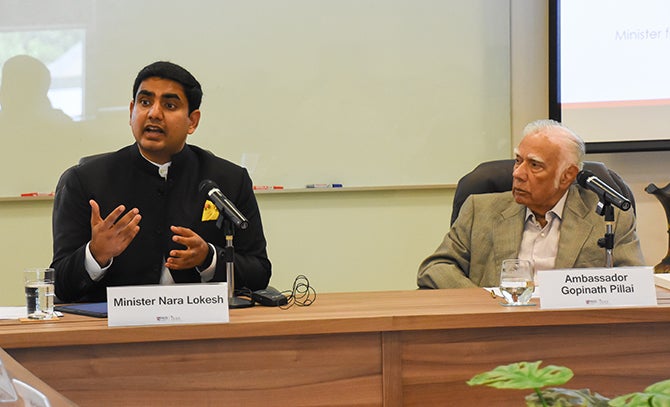
| Event Title: | ISAS Closed Door Roundtable |
| Topic: | Redesigning Policy Making in the 4th Industrial Revolution through Agile Governance |
| Date/Time: | 28 December 2018 | 14:30 - 16:00 |
| Venue: | ISAS Board Room, Level 9, Block B, 29 Heng Mui Keng Terrace, Singapore 119620 |
| Speaker/s: | Mr Nara Lokesh, Minister for Information Technology, Panchayati Raj and Rural Development, Andhra Pradesh, India |
| Chairperson: | Ambassador Gopinath Pillai |
| Description: | The Fourth Industrial Revolution is characterised by rapid, simultaneous and systemic transformations driven by unprecedented impacts from the pace, scale and scope of emerging technologies. In addition, global challenges of climate change, demographic changes and declining trust in institutions are together challenging established governance models and mind-sets. New principles, protocols, rules and policies are needed to accelerate the positive and inclusive impacts of innovation and technologies, while minimizing or eliminating negative consequences and risks. There is an urgent need for a faster, more agile approach to governing emerging technologies and the business models and social interaction structures they enable. Minister Lokesh shall present the platforms used for Realtime Governance in the state of Andhra Pradesh and use of agile government tools for better governance. |
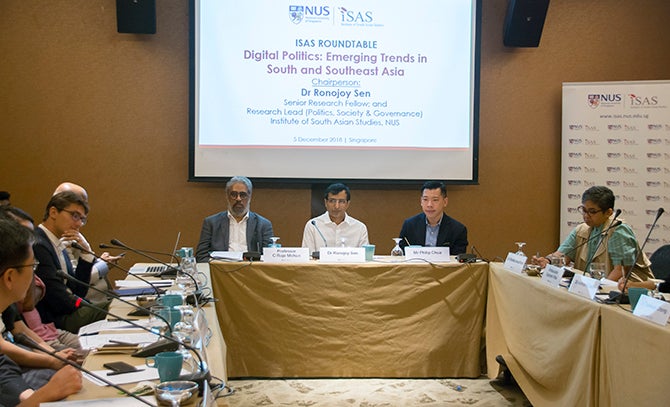
| Event Title: | ISAS Roundtable |
| Topic: | Digital Politics: Emerging Trends in South and Southeast Asia |
| Date/Time: | 05 December 2018 | 10:00 - 12:30 |
| Venue: | Dalvey Room, Level 2, NUSS Guild House, 9 Kent Ridge Drive, Singapore 119241 |
| Speaker/s: | Multiple Speakers |
| Chairperson: | Dr Ronojoy Sen |
| Description: | ISAS organised a roundtable on ‘Digital Politics: Emerging Trends in South and Southeast Asia’ on 5 December 2018 at the NUSS Guild House. The roundtable saw 21 distinguished guests share their views about recent events and key topics in the field of digital politics. The opening address was given by Philip Chua, Global Lead for Government and Elections at Twitter. He said that any mistruths circulated online would beg the question on citizen media literacy. He also highlighted the importance of focussing less on the content being circulated online. Rather, he suggested looking into how information is disseminated and how individuals behave online. This theme of targeting behaviour rather than content underpinned the discussions that followed. Chua concluded with an open-ended statement on the trade-off between having open conversations online and not curbing the freedom of expression. The roundtable began by noting the recent International Grand Committee meeting in the UK on fake news and disinformation, and its implication on Singapore’s deliberations on the issue. Subsequently, the importance of viewing technology as an enabler and as a solution was highlighted. Questions on whether there were any new artificial intelligence or machine learning techniques that could help address content and identify bad actors were raised, as was the issue of how other mediums of social media, such as images, videos and memes, could be regulated. On legislation, the participants emphasised that there could be no single actor serving as an arbiter of truth but rather a multitude of credible actors was necessary. They raised the issue of the impact of legislation on creativity due to the lack of resources to ensure accuracy. This extended to concerns about small media platforms and their future potential. The speakers dwelt on the importance of ensuring democracy despite regulation. There were fears of using regulation for political purposes and apprehensions on the lack of a level playing field for women and marginalised groups to express their opinions. This brought up the question of whether specific or broad laws would be more useful in encouraging self-censorship. The session concluded by reiterating the broader theme of constant evolution in this field and the importance of recognising that regulations operate differently in different ecosystems. |
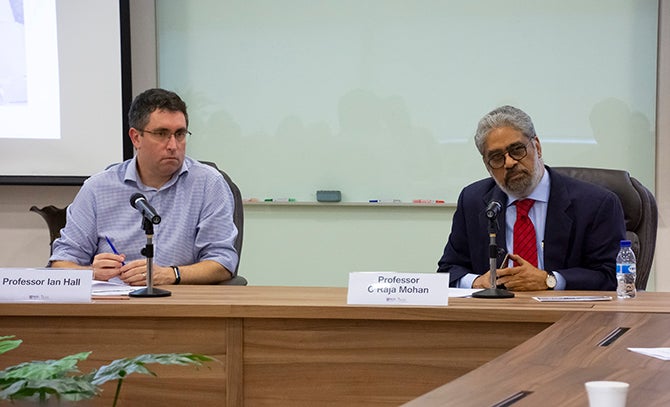
| Event Title: | Narendra Modi’s Religious Diplomacy and the Reinvention of Indian Foreign Policy |
| Topic: | ISAS Seminar |
| Date/Time: | 03 December 2018 | 15:00 - 16:45 |
| Venue: | ISAS Board Room, Level 9, Block B, 29 Heng Mui Keng Terrace, Singapore 119620 |
| Speaker/s: | Professor Ian Hall |
| Chairperson: | Professor C Raja Mohan |
| Description: | Professor Ian Hall teaches International Relations at Griffith University, Queensland, Australia, and is the Deputy Director (Research) of the Griffith Asia Institute was invited to ISAS for a Seminar on the topic ‘Narendra Modi’s Religious Diplomacy and the Reinvention of Indian Foreign Policy’ as he is currently publishing an upcoming book on Modi and the Reinvention of Indian Foreign Policy. This session was moderated by Professor C. Raja Mohan, Director of Institute of South Asian Studies (ISAS). Director C. Raja Mohan opened the seminar by introducing the topic to the audience and said Modi’s Foreign Policy has been widely discussed but there has been less discussion on the aspect of religious diplomacy. The participants comprised of ISAS research staff and members of the public. Prof Ian Hall began his talk with a picture from World Cultural Festival organised by the spiritual/religious organisation Art of Living inaugurated by PM Modi last year. He stated that the event such as this, with over 750 key politicians across the world present, promotes India’s soft power under the theme “One World Family”. Prof Ian then outlined the five pillars of PM Modi’s foreign policy strategy according to Ram Madhav, who drafted the BJP’s 2015 policy document. These are samriddhi (economic prosperity), suraksha (national security), samman (upholding the dignity and honour of Indian citizens and expats), samvad (dialogue and engagement), and sanskriti (culture and civilizational links). He observed the fifth pillar sanskriti is used extensively in PM Modi’s foreign policy. He observed that PM Modi made the cultural references on global stage such as the Shangri-La Dialogue. This means the approach of viewing the world is based on culture-culture than society-society. On the topic of public diplomacy, Professor Ian Hall observed there has been a rise in campaigns to engage more deeply with the public under the Modi government. While the last three governments have all engaged in public diplomacy and soft power campaigns such as Incredible India, the Modi government went one step further by using other means to engage in public diplomacy such as PM Modi himself promoting yoga, using Twitter effectively and holding radio shows to engage with the public. Prof Hall noted PM Modi’s increasing emphasis on cultural and religious ties. PM Modi’s visits to religious sites in Sri Lanka, Buddhist temples in Nepal and mosques in the Arab countries are to emphasise past cultural, intellectual and religious ties. This is part of the Modi government’s emphasis on civil-society diplomatic activities, mostly using India’s diaspora as a quasi-diplomatic tool. The constant cultural engagement is to protect diaspora interests. Prof Hall concluded with Modi’s reinvention of foreign policy outlined in two aspects: a) dropping the Nehruvian idea of foreign policy, b) foreign policy sought through Hindu ideology with religious diplomacy at the centre. Although foreign policy may not help PM Modi win domestic elections, it will certainly create a perception of global leadership among the Indian citizens. Prof Hall’s remarks were followed by a Question and Answer session with the audience. Prof Hall fielded questions on soft power, the concept of religion and state being merged and instrumentalising religion for the purpose of foreign policy and diplomacy. |
| Youtube: | https://youtu.be/b-Y34xzra2E |
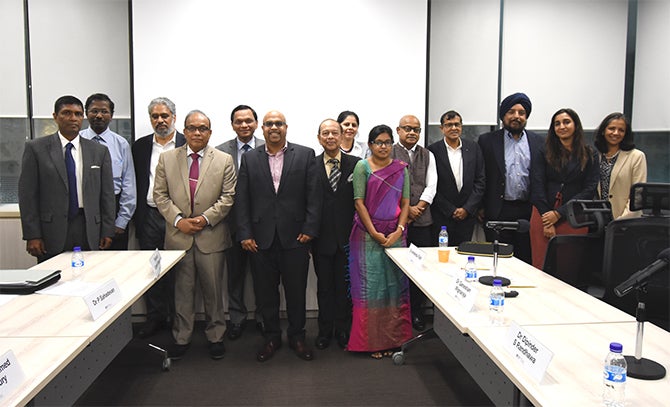
| Event Title: | ISAS Workshop |
| Topic: | Maritime Sri Lanka: Reclaiming Indian Ocean Security |
| Date/Time: | 28 November 2018 | 09:30 - 17:00 |
| Venue: | Conference Room, AS8 Building, Level 6, South Asian Studies Programme, 10 Kent Ridge Crescent, NUS, Singapore 119260 |
| Speaker/s: | Multiple Speakers |
| Description: | A full day workshop titled ‘Maritime Sri Lanka: Reclaiming Indian Ocean Identity’ was held on 28 November 2018. Organised by ISAS, the workshop saw a range of speakers discussing the historical, strategic and economic aspects of Sri Lanka’s Indian Ocean identity. ISAS Director Professor C Raja Mohan made the opening remarks where he said that Sri Lanka is in the focus and is going to be an important part of the world. There has been much discussion lately on how Sri Lanka is an Indian Ocean rather than a South Asian state. The keynote address was given by Professor Mohan Munasinghe via a video recording where he shared that Sri Lanka is reclaiming instead of transforming its Indian Ocean identity. He then explored how Sri Lanka is one the first countries to embark on the Balanced Inclusive Green Growth (BIGG) Path. Colombo wants to be a dynamic and thriving Indian Ocean hub by 2030. After the keynote address, was the first panel titled ‘Historical and Contemporary Perspectives’ which discussed the paradigm shifts, strategic realities and shifting of power in Sri Lanka. This panel also explored how Colombo has been developing its maritime identity after the civil war. The sea is seen as integral to its national consciousness. The end of the civil war opened new political avenues for Sri Lanka to rebuild its image. The second panel titled ‘Sri Lanka in the Indian Ocean: Geopolitical Imperatives’ saw discussions on the strategic placement of Sri Lanka in the Indian Ocean. Post-independent Sri Lanka helped it to have a clear stand in its foreign policy initiatives. However, a rules-based order is important for small states like Sri Lanka. There was a general consensus that Sri Lanka will become a significant player in the ocean. The third panel titled ‘Sri Lanka as an Economic Hub: Issues and Prospects’ saw conversations on the Indian Ocean economy, policy challenges, diplomacy initiatives and the country’s domestic and regional performance. |
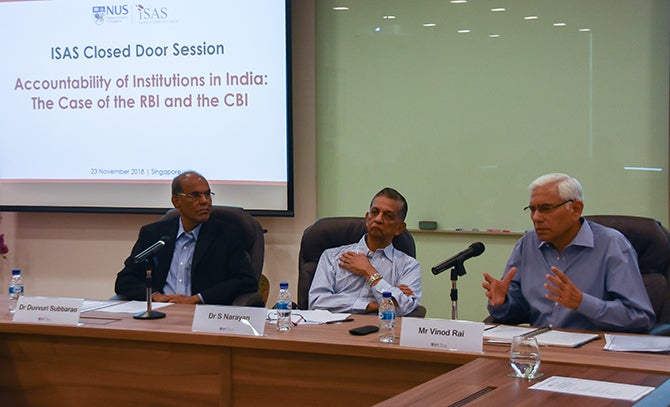
| Event Title: | ISAS Closed Door Session |
| Topic: | Accountability of Institutions in India: The Case of the RBI and the CBI |
| Date/Time: | 23 November 2018 | 10:00 - 11:30 |
| Venue: | ISAS Board Room, Block B, Level 9, 29 Heng Mui Keng Terrace, Singapore 119620 |
| Speaker/s: | Dr S Narayan, Dr Duvurri Subbarao, Mr Vinod Rai |
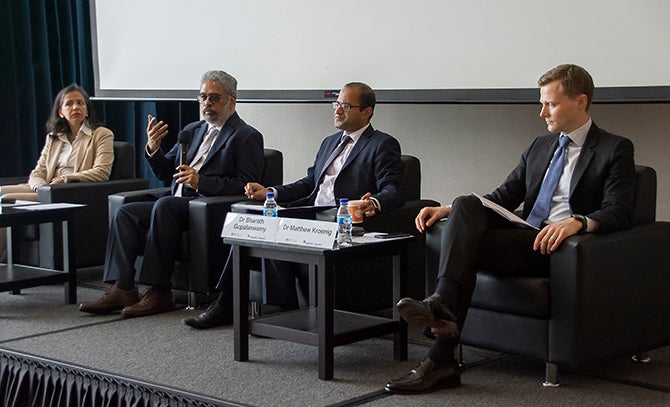
| Event Title: | Atlantic Council-ISAS Symposium |
| Topic: | Analysing the United States’ Vision for the Indo-Pacific |
| Date/Time: | 20 November 2018 | 13:30 - 16:00 |
| Venue: | UNDP Auditorium, 29 Heng Mui Keng Terrace, Block A, Level 8, Singapore 119620 |
| Speaker/s: | Multiple Speakers |
| Description: | ISAS organised a symposium on ‘Analysing the United States’ Vision for the Indo-Pacific’ in partnership with the Atlantic Council on 20 November 2018. The panellists for the symposium were Professor C Raja Mohan, Director, ISAS; Dr Bharath Gopalaswamy, Director of the Atlantic Council’s South Centre; Dr Matthew Kroenig, Deputy Director for Strategy at the Atlantic Council’s Scowcroft Center for Strategy and Security; and Dr Rani Mullen, Visiting Research Fellow, ISAS.The symposium began with welcome remarks by Dr Gopalaswamy and Professor Mohan. Dr Kroenig presented a brief history of the Council. He then spoke about the America’s ‘Free and Open Indo-Pacific’ (FOIP) vision, how this vision is different from before, and the specifics of the vision. Following Dr Kroenig’s presentation, Dr Gopalaswamy’s remarks focused on the US American pivot to Asia, the areas of focus such as commerce, infrastructure and energy, and the private sector focus of the vision. In her remarks, Dr Mullen questioned whether the new American vision and investment would be able to meet the challenge of competing in the region with China and ASEAN’s response to the competition. The remarks by the panellists were followed by an interactive discussion with the audience. The points of discussion included the difference between the FOIP and the Washington Consensus, inclusive development as part of the American vision, South Asia’s role in the Indo-Pacific, the sustainability of the Indo-Pacific without India, the pressure and implications of Sino-US competition on ASEAN, the commitment of India to the Indo-Pacific, impact of US disengagement on the federal American structure, and the historical context for Indo-Pacific rivalry. |
| Youtube: | https://www.youtube.com/watch?v=MOULovYjriA |
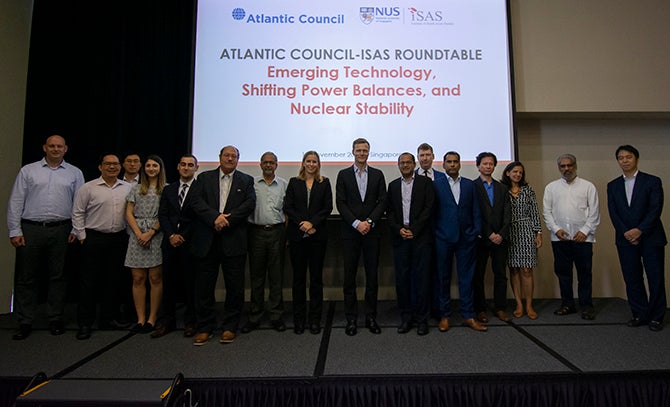
| Event Title: | Atlantic Council-ISAS Roundtable |
| Topic: | Emerging Technology, Shifting Power Balances and Nuclear Stability |
| Date/Time: | 19 November 2018 | 10:00 - 17:00 |
| Venue: | UNDP Auditorium, Block A, Level 8, 29 Heng Mui Keng Terrace, Singapore 119620 |
| Speaker/s: | Multiple Speakers |
| Description: | ISAS organised a symposium on ‘Emerging Technologies, Shifting Balances of Power, and Nuclear Stability’ in partnership with the Atlantic Council on 19 November 2018. The roundtable included experts from the United States, China, Russia, India, and Japan. The symposium began with opening remarks by Professor C Raja Mohan, Director, ISAS. Dr Matthew Kroenig, Deputy Director for Strategy at the Atlantic Council’s Scowcroft Center for Strategy and Security presented a brief history of the Council and then presented on the Council’s project on how emerging technology could affect nuclear stability. The presentation listed emerging technologies (including their capabilities and implications), critiques and defences of the conventional wisdom, and they hypothesis that emerging technology’s effect of the broader balance of power is a greater risk to strategic stability.Following Dr Kroenig’s presentation, the participants discussed the topic in the context of four different themes: evaluating the conventional wisdom on emerging technology and strategic stability, the state of play of emerging technologies, the geopolitical context and flashpoints, and policy implications for arms control, non-proliferation and exports control. Three experts presented in each thematic session followed by an interactive discussion between the roundtable on the theme. The discussions on the first theme covered points of discussion such as the stabilising effect of arms races, the ‘layers’ of strategic stability and its nature, and non-rational use of technology. The second thematic session covered points such as new and conventional weapons capabilities and their impact, the challenges and uses of new technologies, and competition in technologies between different countries. In the third session, the experts discussed technologies in the context of geopolitical flashpoints such as South Asia, the ‘grey zone’, and great powers like Russia, China and the US. The final session considered policy implications related to arms control, a ‘cascading’ security dilemma, the possibility of a non-proliferation treaty (NPT) type arrangement for weapons, and codes of conduct. |
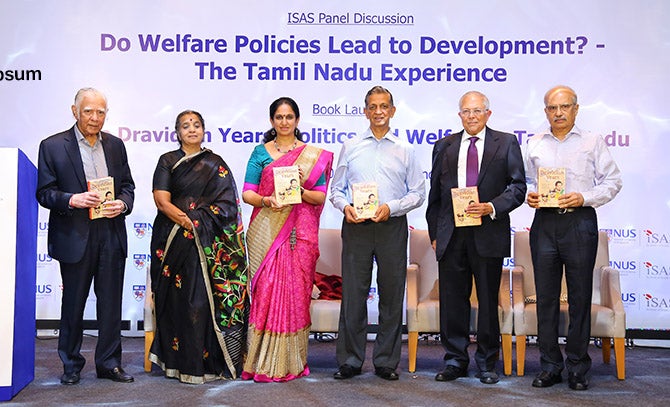
| Event Title: | ISAS Panel Discussion and Book Launch |
| Topic: | Do Welfare Policies lead to Development? – The Tamil Nadu Experience |
| Date/Time: | 30 October 2018 | 17:30 - 21:00 |
| Venue: | The Westin Chennai Velachery 154, Velachery Main Road | Velachery | Chennai |
| Speaker/s: | Ambassador Gopinath Pillai, Dr S Narayan, Mr N Ravi, Mr R Pooranalingam, Mrs Vanitha Dalta, |
| Chairperson: | Dr S Narayan |
| Youtube: | https://youtu.be/3Q2P77qVPNE |
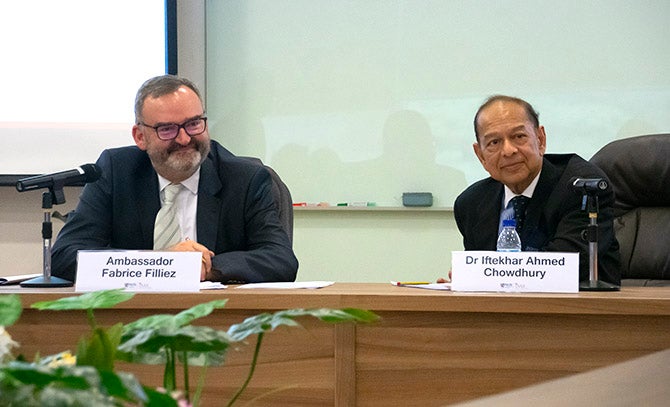
| Event Title: | Switzerland in Asia: Burgeoning Links with South Asia and ASEAN |
| Topic: | ISAS Ambassadors' Lecture Series |
| Date/Time: | 30 October 2018 | 15:00 - 16:45 |
| Venue: | ISAS Board Room, Level 9, Block B, 29 Heng Mui Keng Terrace, Singapore 119620 |
| Speaker/s: | Ambassador Fabrice Filliez |
| Chairperson: | Dr Iftekhar Chowdhury |
| Description: | Dr Iftekhar Chowdhury, principal research fellow at the Institute of South Asian Studies, NUS and former foreign minister of Bangladesh, chaired the session titled, ‘Switzerland in Asia: Burgeoning Links with South Asia and ASEAN’. He opened the session by highlighting the critical role that Switzerland plays as an international actor, contributing to stability, peace and progress in the region and the world. Dr Chowdhury lauded Switzerland for remaining a constructive place for situating international institutions and also the ability of the Swiss to enable dialogue between conflicting parties, as in the Gorbachev-Reagan Dialogue. Ambassador Fabrice Filliez described Switzerland’s relationship with ASEAN followed by Switzerland’s relationship with South Asia. On ASEAN, he mentioned the international cooperation activities that Switzerland has been pursuing in ASEAN, such as improving the living conditions of ASEAN people, reducing development gaps and providing humanitarian engagement. He sectioned Switzerland-ASEAN cooperation into 4 parts: climate change and disaster risk reduction, human security, vocational training and food security. He shared that there have been 26 projects, amounting to 7 million USD in these domains. On India, he celebrated the 70th anniversary since the signing of the Treaty of Friendship between the two countries. He also brought up the salient issue on cooperation with India on tax investigation, allowing automatic information exchange between the two countries. He also shared on the good relationship that Switzerland has had with Pakistan through investment protection, double taxation and disaster relief, with Bangladesh through poverty reduction, direct investment and development cooperation, and with Sri Lanka through reforms, reconciliation, investment protection and humanitarian assistance. Key questions that arose were regarding Switzerland’s view on referendums and tips on how the implementation of vocational institutes vis-à-vis university education was so successful in Switzerland. On the former, he answered that an educated population who are capable of practicing direct democracy was needed. On the latter, he shared the importance of acknowledging positive contribution to society and growth of the sector rather than the company alone. |

| Event Title: | ISAS-CII Distinguished Lecture 2018 |
| Topic: | Higher Education in Singapore |
| Date/Time: | 29 October 2018 | 14:45 - 17:30 |
| Venue: | The Westin Chennai Velachery 154, Velachery Main Road | Velachery | Chennai |
| Speaker/s: | Professor Tan Eng Chye, Ambassador Gopinath Pillai, Mr N Kumar, Professor Bhaskar Ramamurthi |
| Chairperson: | Professor Bhaskar Ramamurthi |
| Youtube: | https://youtu.be/uS2abygyK_Q |
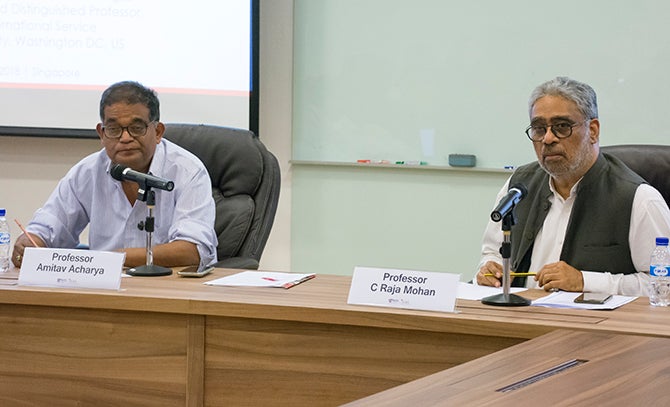
| Event Title: | Power Shift and the Regional Architecture of the Indo-Pacific |
| Topic: | ISAS Seminar |
| Date/Time: | 24 October 2018 | 15:00 - 16:45 |
| Venue: | ISAS Board Room, Level 9, Block B, 29 Heng Mui Keng Terrace |
| Speaker/s: | Professor Amitav Acharya |
| Description: | The ISAS Closed Door Session: Power Shift and the Regional Architecture of the Indo-Pacific was held on 20 October 2018. Organised by ISAS, the speaker Professor Amitav Acharya said that the Indo-Pacific is a work in progress. He discussed three areas during the session. First he shared that Asia-Pacific Regionalism started with a Pan Asian framework. There are different approaches towards the Indo-Pacific concept. While ASEAN wants Indo-Pacific to be renamed to Indo-Asia-Pacific, countries such as Australia are happy with the current terminology. Second, he shared on how ASEAN centrality is an idea goes a long way back. There was a rejection of great power leadership where ASEAN did not want to be dominated by anyone. Third, he discussed on the impact of China’s rise on regionalism where Beijing was the single most catalyst in the 1990s. However, the sentiments towards China have changed over time. There are now divisions within ASEAN on how to deal with China’s Belt and Road Initiative (BRI). In conclusion, he said that ASEAN centrality is middle power orientation. There are different ideas and concepts of the Indo-Pacific. Japan’s concept of the Indo-Pacific is more in line with the US’s approach on how it should be “free and open”. There are likely to be many challenges when the Indo-Pacific is formalised further. |
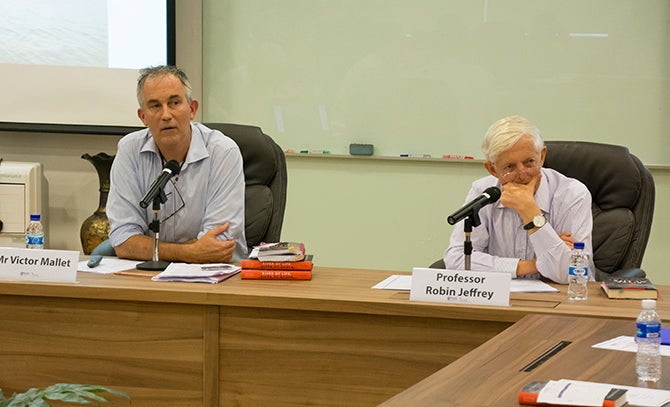
| Event Title: | Modi and the Ganges: Governance in India |
| Topic: | ISAS Seminar |
| Date/Time: | 04 October 2018 | 15:00 - 16:30 |
| Venue: | ISAS Board Room, 29 Heng Mui Keng Terrace, Block B, Singapore 119620 |
| Speaker/s: | Mr Victor Mallet |
| Chairperson: | Professor Robin Jeffrey |
| Description: | On 4 October 2018 the ISAS Seminar “Modi and the Ganges: Governance in India” discussed the latest book “River of Life, River of Death: The Ganges and India’s Future” (OUP) by Mr Victor Mallet, author, journalist and editor with more than three decades of experience in Asia, Europe, the Middle East and Africa. The seminar developed around the main themes of the book: an assessment of the failures of Modi’s Swachh Bharat campaign; the nature of the water body of the Ganga, including the issue of anti-biotic resistant super-bugs; questions of religious practice and belief; and the effects that technologies have had on the river. According to Mallet the Ganga/Ganges is one of the main Asian waterways, in fact arguably the world’s most important river, and cradle of the Indic civilization. Despite all environmental issues which characterize its current situation and which did take a toll on its ecosystem, Mallet maintains that the Ganga is still alive, a river of life, as proved by the continuity of its worship as well as by the rich Gangetic wildlife which still inhabits some of the river tracts. |
| Youtube: | https://youtu.be/o-eBuLX47mY |
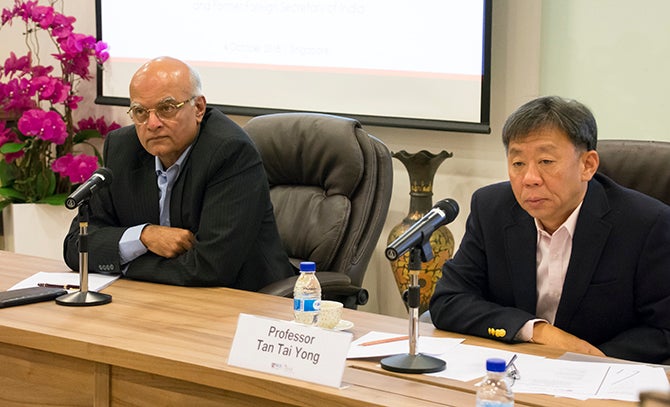
| Event Title: | Crucial Issues in Indian Foreign Policy |
| Topic: | ISAS Closed Door Session |
| Date/Time: | 04 October 2018 | 10:00 - 11:30 |
| Venue: | ISAS Board Room, 29 Heng Mui Keng Terrace, Block B, Singapore 119620 |
| Speaker/s: | Ambassador Shivshankar Menon |
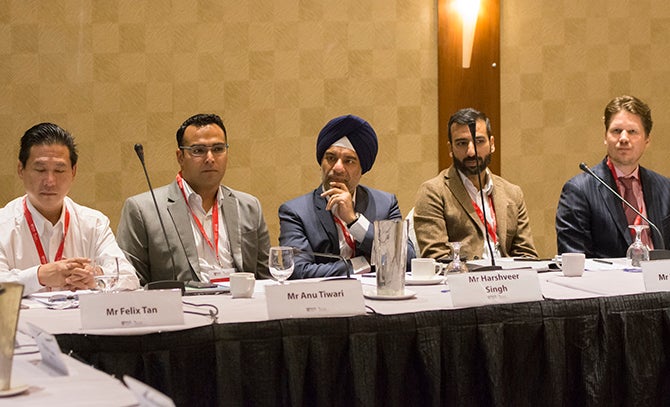
| Event Title: | India-Singapore FinTech Cooperation: Opportunities and Challenges |
| Topic: | ISAS Roundtable |
| Date/Time: | 03 October 2018 | 12:30 - 17:30 |
| Venue: | NUSS Guild House, 9 Kent Ridge Drive |
| Speaker/s: | Multiple Speakers |
| Description: | The Institute of South Asian Studies at the National University of Singapore organised a Roundtable on ‘India-Singapore FinTech Cooperation: Opportunities and Challenges’ on 3 October 2018 to better understand how Singapore and India could leverage their complementary strengths in FinTech and the digital economy, to strengthen collaboration and mutual benefits between the two growing FinTech players. The motivation for the Roundtable arose from a memorandum of understanding (MoU) signed between the Singapore and Indian governments in June 2018 to strengthen cooperation in financial innovation through the establishment of a Joint Working Group. This MoU builds upon a growing level of cooperation between the two countries in business-to-business cooperation, increasing cross-border investment and several initiatives to ease cross-border financial engagement in FinTech. The Roundtable saw a total of 32 selected participants from establishments such as the Monetary Authority of Singapore, OCBC Bank, World Bank, MasterCard, NITI Aayog and Centre for Policy Research (CPR) India. |
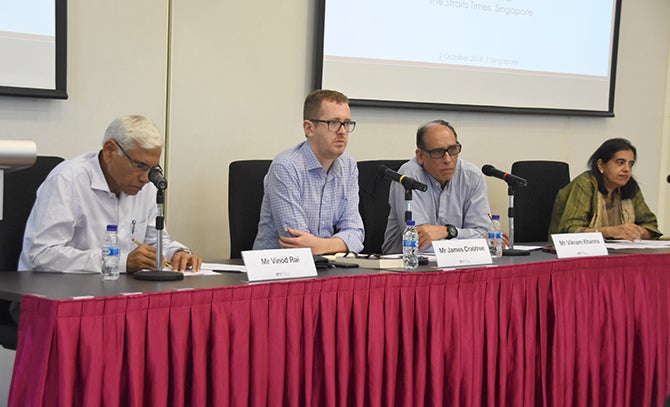
| Event Title: | The Billionaire Raj: Business, Corruption and Growth in India and Beyond |
| Topic: | ISAS Panel Discussion |
| Date/Time: | 02 October 2018 | 15:30 - 17:30 |
| Venue: | MEI Conference Room, Level 6 (Block B), 29 Heng Mui Keng Terrace, Singapore 119620 |
| Speaker/s: | Multiple Speakers |
| Description: |
The session explored inequality and cronyism in India amidst its rapid economic development which is characterised by extremes of wealth creation and unstable industrial growth. The first panellist, James Crabtree argued that post-1991, as India pursued liberalisation, and as economic growth picked up pace, the proceeds of that growth went disproportionately to the very top. This has resulted in the creation of a super-rich class and a heightened disparity between the rich and the poor. He attributed the rise of billionaires to entrepreneurship embellished in political connections, crony capitalism, and corruption scandals – which he alleged allowed them easy access to large loans from public sector banks. These scandals received strong reactions from the public and resulted in the election of Modi on an anti-corruption platform. However, Crabtree argued cronyism, nepotism and excesses of India’s billionaire class have continued, with newer dynasties joining the ranks of this small and powerful elite. He made particular mention of the weak banking system in India where the Modi government has had the weakest records. Nonetheless, Crabtree concluded with cautious optimism for India’s future and remarked that just as America’s and Singapore’s gilded age preceded the policies to remedy inequality, he foresees India riding into a more just and less corrupt future as it passes this period.
Mr Vinod Rai discussed how cronyism rose in India in recent years. He attributed it to the involvement of corporate entities on electoral campaigns. In return of their support, contracts and licences are given to these entities, irrespective of their domain capabilities. These companies then borrow huge amounts of money from banks who are encouraged to lend for infrastructure projects. The monies are not necessarily put into the projects that are apportioned to them. He also stated that the same phenomenon is true about regional political partners of coalition governments. These parties have their own affiliation to corporate entities that support them. Most regional ministers who were acquitted by the trial court in this regard in recent years indicated that they had informed the PMO about their plans. Furthermore, large number of infrastructure projects which required statutory clearances from the government did not get through clearances, even when they were genuine. So, time over-runs lead to cost-over runs. Today, India has about nine trillion rupees stuck in bank loans. In an attempt to solve this problem, Rai explained that Indian Supreme Court has recently introduced an electoral reform whereby politicians, their spouses and associates have to file affidavits on their assets and sources of income at the time of filing nomination papers. He also stated that there is a growing political vigilantism among Indian citizen, who have started asking the right questions to government – which may also help to curb cronyism in the country. |
| Youtube: | https://youtu.be/JAJ3nWAyYGw |
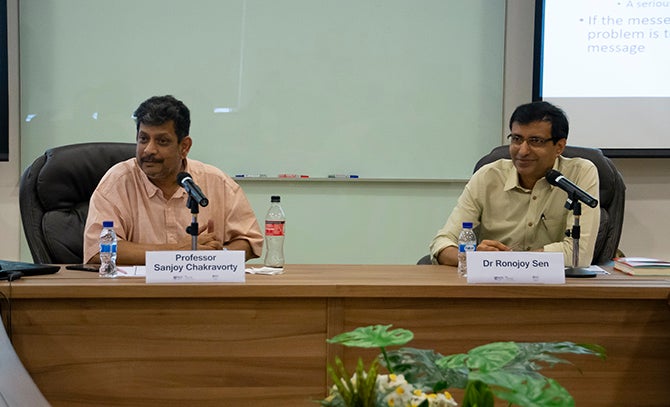
| Event Title: | The Truths of India: Information and Society from Manu to Modi |
| Topic: | ISAS-SASP Seminar |
| Date/Time: | 27 September 2018 | 15:00 - 16:45 |
| Venue: | ISAS Board Room, Level 9, Block B, 29 Heng Mui Keng Terrace, Singapore 119620 |
| Speaker/s: | Professor Sanjoy Chakravorty |
| Speaker Biography/s: | Sanjoy Chakravorty is Professor of Geography and Urban Studies at Temple University and Visiting Fellow at the Center for the Advanced Study of India, University of Pennsylvania. His current research focuses on theoretical and empirical work on India, inequality, cities, land and epistemology. He also writes fiction. His recent books include The Other One Percent: Indians in America (2016, a collaborative work on the Indian diaspora), The Promoter (2015, a novel) and The Price of Land: Acquisition, Conflict, Consequence (2013). His research has been supported by the National Science Foundation, the National Institute of Justice, the American Institute of Indian Studies, and the World Bank. His forthcoming books include The Truth About Us: Information and Society from Manu to Modi, and two coedited collections on land and Delhi. |
| Description: | Professor Sanjoy Chakravorty, Professor of Geography and Urban Studies, Temple University, and Visiting Fellow, Centre for the Advanced Study of India, University of Pennsylvania, USA and ISAS Academic Visitor presented a seminar on the topic of ‘The Truths of India: Information and Society from Manu to Modi’. The session was moderated by Dr Ronojoy Sen, Senior Research Fellow and Research Lead (Politics and Governance), ISAS. Dr Ronojoy began the proceeding by introducing Professor Chakravorty to the audience. The audience included ISAS staff members and members of the public. Professor Chakravorty began by speaking about the concept of ‘truth’. He then put forth two ‘existential questions’ for India which are about the identity of the Indian collective and the trajectory of justice. Professor Chakravorty further laid out two primary arguments. The first is that there is a need to understand the ‘politics of truth’ which involved the variables of power over information and the available information technology. The second argument is that complex information must be reduced to its simplest form to provide cognitive unity. The second argument has certain corollaries as follows:
The more complex the information, the greater the need for simple information; The more the quantity of information, the greater the need for simple information; The greater the number of sources, the less relevant thy all are. Professor Chakravorty then expounded on simplification in the age of ‘scrolls’. He explained that in India, the colonizers created Hinduism by aggregating non-Muslims and creating a common law for Hindus. As such, in a sense, there was no history of India before the British came and gave one. The next section of the seminar focused on ‘simplification’ in the age of smartphones, which, according to European/American literature, can take 3 paths as follows, Populism, Communication building and Accelerated pluralism. Professor Chakravorty then brought together his theses and suggested that there were two paths in India: Democratization, which would have positives such as demise of colonial land laws and negatives such translocal organization by hate groups. The second path being the increasing relevance of simple information which involves aspects such as branding, polarizations and the emphasis on the messenger him/herself being the message. The presentation was followed by an interactive session with the audience. Points of discussion included whether ‘simple information’ is a new concept, the meaning and categorization of information itself, the institutionalisation of information, the new age media, and the caste system in India. |
| Youtube: | https://youtu.be/ERU2EBgxBj4 |
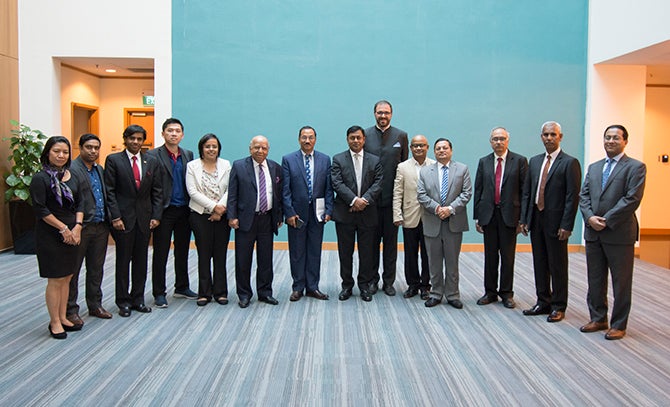
| Event Title: | BIMSTEC at 20: Priorities and Prospects |
| Topic: | ISAS-COSATT-KAS Workshop |
| Date/Time: | 24 September 2018 | 10:30 - 17:45 |
| Venue: | UNDP Auditorium, 29 Heng Mui Keng Terrace, Block A, Level 8, Singapore 119620 |
| Speaker/s: | Multiple Speakers |
| Description: | On 24 September 2018 at the workshop "BIMSTEC at 20: Priorities and Prospects" scholars, policy-makers and dignitaries reflected on the achievements and future challenges of the Bay of Bengal Initiative for Multi-Sectoral Technical and Economic Cooperation (BIMSTEC). The event was the result of joint efforts by the Institute of South Asian Studies (ISAS), the Consortium of South Asian Think Tanks (COSATT), and the Konrad Adenauer Stiftung of Singapore (KAS). The event was opened by the representatives of the three partner organizations: Dr Amitendu Palit, Senior Research Fellow and Research Lead for Trade and Economics (ISAS); Dr Nishchal Pandey, Convenor of COSATT, and Mr Christian Echle, Director of the Regional Programme POlitical Dialogue Asia (KAS).
Focused on a variety of fields, including economic integration, connectivity, energy and counter-terrorism, BIMSTEC is the only organization bridging the two regions of South and Southeast Asia. Its aims at boosting multi-sectorial integration among member countries -- Bangladesh, Bhutan, India, Myanmar, Nepal, Sri Lanka, Thailand. With the latest BIMSTEC Summit concluded just one month ago in Nepal, the proposed reinvigoration of the 20 years-old organization acquires particular significance within the contemporary international context, characterized by the return of nationalist and protectionist policies. In his Keynote Address Amb M Shahidhul Islam, Secretary of BIMSTEC, said he was optimist with regard to the future prospects of the organization. He highlighted that along the years it progressively expanded its outreach/expertise/focus, while undergoing a process of institutional transformation which led -- among the other things -- to the institution of the Secretariat headquartered in Dhaka (2014). In his Keynote Address Amb M Shahidhul Islam, Secretary of BIMSTEC, said he was optimist with regard to the future prospects of the organization. He highlighted that along the years it progressively expanded its outreach/expertise/focus, while undergoing a process of institutional transformation which led -- among the other things -- to the institution of the Secretariat headquartered in Dhaka (2014). The 4h BIMSTEC Summit (Kathmandu, 30-31 August 2018) highlighted the need for the organization to improve on implementation and efficiency. The proposal of identifying few core areas of collaboration was advanced by Thailand to this purpose. Amb Islam commented that, while such possibility is being considered, there is no doubt that Trade & Investments and Connectivity will remain at the core of BIMSTEC’s work. He also added that he is confident that the FTA will soon be signed. While delivering the Special Address, Amb Ong Keng Yong -- Executive Deputy Chairman of the S Rajaratnam School of International Studies at the Nanyang University of Singapore highlighted that the current will to strenghten the BIMSTEC mechanism provides an opportunity that shall not be missed. It is therefore imperative to act quickly to produce tangible results. He added that enhancing infrastructure and standardize regulations to allow people and goods to travel across borders easily are of fundamental importance to this purpose. In addition to this, equally necessary steps will include digitalization of the local economy and engagement local populations. Rather than further expanding the potential foci of its activity -- AMb Ong said -- BIMSTEC shall target “low hanging fruits” such as business and market development. These will create goodwill and trust in the organization’s potential: a virtuous spillover effect able to open the way to other types of cooperation. In the following two panels specialists in the field heading from the various BIMSTEC member states offered a country-perspective on the organization and the possible way ahead. The featured panellists were Amb Biren Nanda (Senior Fellow, Delhi Policy Group); Mr Kamal Thapa (Former Deputy Prime Minister and Former Minister of Foreign Affairs of Nepal); Mr Asanga Abeyagoonasekera (Director General, Institute of National Security Studies of Sri Lanka); Mr Faiz Sobhan (Senior Research Director, Bangladesh Entreprise Institute); Prof Nu Nu Lwin (Professor, Yangon University of Economics); Dr Sathaporn Opasanon (Associate Professor, Thamassat University). Maj Gen (Retd) ANM Muniruzzaman (President of Bangladesh Institute of Peace and Security Studies) and Maj Gen AKM Abdur Rahman (Director of Bangladesh Institute of International and Strategic Studies) chaired the two sessions. |
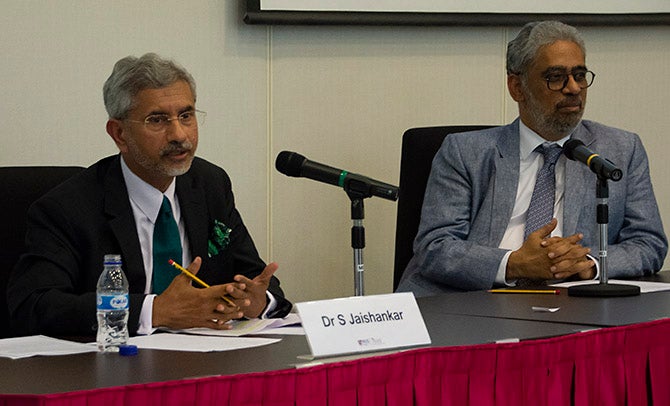
| Event Title: | In Conversation with Dr S Jaishankar |
| Topic: | The United States and South Asia: Assessing the New Dynamics |
| Date/Time: | 14 September 2018 | 14:30 - 16:15 |
| Venue: | MEI Conference Room, Level 6, Block B, 29 Heng Mui Keng Terrace, S(119620) |
| Speaker/s: | Dr S Jaishankar |
| Chairperson: | Professor C Raja Mohan |
| Youtube: | https://youtu.be/8Jf1F0qp5xQ |
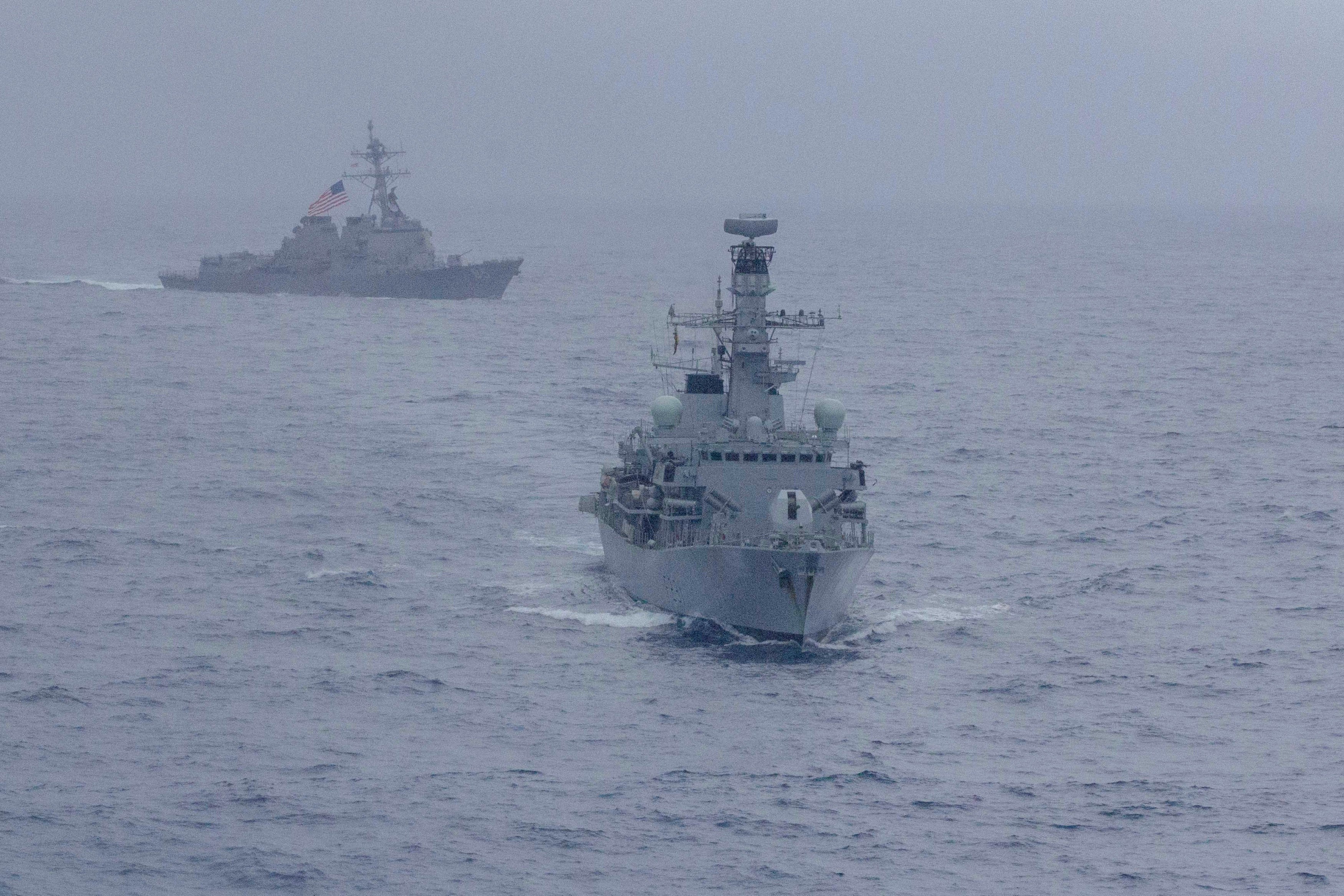
| Event Title: | ISAS-SASP Joint Seminar |
| Topic: | India, Europe and the Indo-Pacific |
| Date/Time: | 31 August 2018 | 15:00 - 17:00 |
| Venue: | AS8, #06-46, Conference Room, Faculty of Arts & Social Sciences, NUS |
| Speaker/s: | Prof C Raja Mohan, Director |
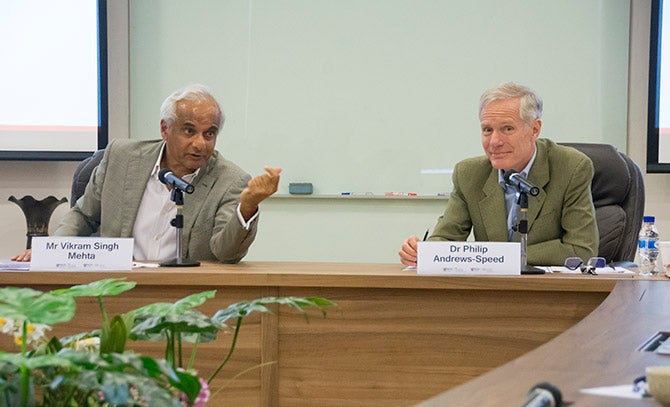
| Event Title: | ISAS-ESI Joint Seminar |
| Topic: | India’s Global Energy Engagements: Ambitions and Outcomes |
| Date/Time: | 31 August 2018 | 15:00 - 17:00 |
| Venue: | ISAS Board Room, Level 9, 29 Heng Mui Keng Terrace |
| Speaker/s: | Mr Vikram Mehta |
| Description: | The session discussed India’s energy crisis and global engagements. The speaker attributed India’s energy crisis to three broad factors – (1) its increasing demand for energy, stemming from its rising population, increasing urbanisation and cumulative impact of policies such as subsidised pricing, inefficiency in usage of energy, and lack of coordination among different governmental agencies – which have encouraged the wasteful consumption of energy in the country; (2) inability of energy supply to keep in pace with demands due to resource constraints, absence of infrastructure to access energy and bring to consumers, pricing mechanism and policies that discourage in investment in domestic productions, and (3) inadequate investment in cleaner energy and obliviousness to environmental concerns.
He highlighted how India is dependent on other nations for its energy supplies. Although India is aggressively increasing its solar generation capacity, the dependence on fossil fuels for transportation and coal for generation is likely to continue in the foreseeable future, he asserted. He shared that India imports 82% of its oil, mainly from Iraq, Saudi Arabia and Iran. Its gas is mostly imported from Qatar, Australia, the USA and Russia. India’s coal imports are also increasing although it has the 5th largest deposits of coal in the world – its major suppliers include Australia, USA, Indonesia and South Africa. He noted that most of India’s relationships with the countries have been transactional and unembedded on strategic relationship. As such, India has been unable to establish how it would protect its assets in these countries in the event of geo-political upheaval or domestic strife. He made particular mention of the possible effects of ongoing conflicts and issues in the Middle-East (e.g. US sanctions on Iran, Saudi Arabian relations with Iran and Qatar) on India given the latter’s heavy reliance on energy imports from the region. He also addressed the lack of an agency in India that can take a holistic overview of how India can deploy its “balance sheet” in regards to its energy sector, despite being heavily invested in global markets. To enhance the competitiveness of power overtures or initiatives and ensure India’s investments are protected, he suggested creating coordinating mechanisms in the PM office. |
| Youtube: | https://youtu.be/zM1V9S8oKJM |
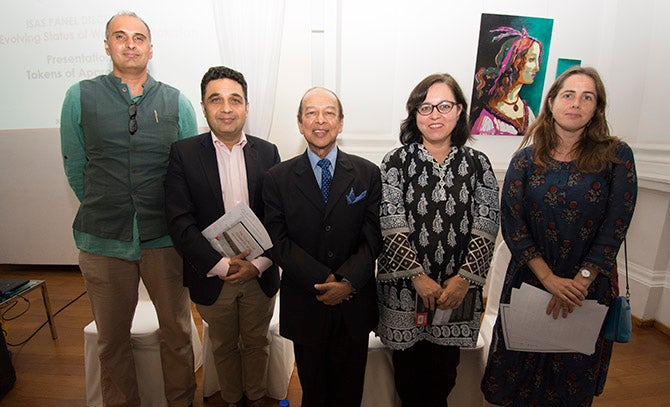
| Event Title: | ISAS Panel Discussion & Art Exhibition |
| Topic: | The Evolving Status of Women in Pakistan |
| Date/Time: | 30 August 2018 | 16:30 - 19:30 |
| Venue: | The Blue Room, Arts House, 1 Old Parliament Lane |
| Speaker/s: | Multiple Speakers |
| Description: | ISAS organised a panel discussion and art exhibition titled ‘The Evolving Status of Women in Pakistan’ on 30 August 2018. The session was chaired by Dr Iftekhar Ahmed Chowdhury, Principal Research Fellow at ISAS. Dr Chowdhury introduced the topic and shared that women’s role in Pakistan has changed significantly over the years. Four panellists from the academic, arts and corporate sectors then shared their expertise and knowledge on the issue. The first speaker, Dr Emma Jane Flatt, Visiting Research Fellow at ISAS, said that social media is a double edge sword. She gave a highly detailed presentation on the various cases of sexual violence in Pakistan, and how social media has been both a bane and a boon. The second speaker, Ms Samina Islam, Multidisciplinary Artist and Educator, shared about the curation of art in Pakistan. She also said that artists in Pakistan do not make sculphures since physical representation is forbidden in Islam. The third speaker, Associate Professor Iqbal Singh, Visiting Research Associate Professor at ISAS, spoke about the legal representation of women in Pakistan. He also said that there are institutional hurdles that prevent women from reaching the topic. The final speaker, Mr Imran Nasrullah, Chief Executive Officer and President Director, Cargill Pakistan; and Director, Cargill Asia Pacific Singapore, shared the business side of the issue. He said that there has been a rise in the number of female entrepreneurs in Pakistan. After the panel discussion, the opening of the art exhibition was inaugurated by Professor C Raja Mohan, Director of ISAS. |
| Youtube: | https://youtu.be/_14_1CIW_IE |
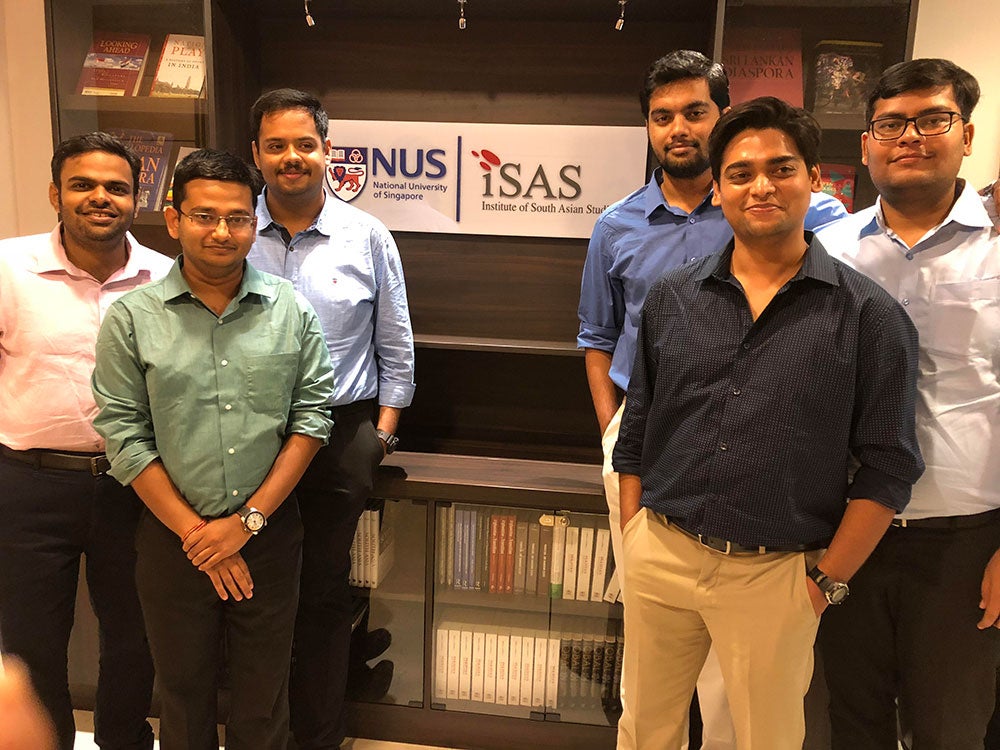
| Event Title: | ISAS Roundtable |
| Topic: | IIM-Nagpur Singapore Immersion Programme |
| Date/Time: | 29 August 2018 | 11:00 - 04:18 |
| Venue: | ISAS Board Room, Level 9, 29 Heng Mui Keng Terrace |
| Speaker/s: | Multiple Speakers |
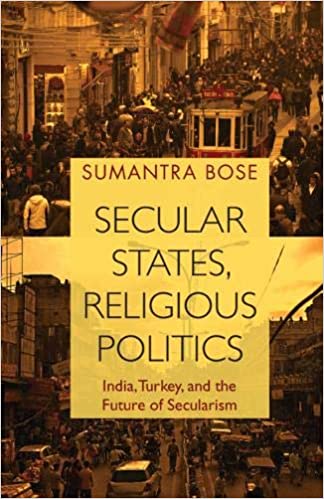
| Event Title: | ISAS-MEI Joint Seminar |
| Topic: | Secular States, Religious Politics: India, Turkey and Future Secularism |
| Date/Time: | 28 August 2018 | 16:00 - 17:30 |
| Venue: | MEI Conference Room, Level 6, 29 Heng Mui Keng Terrace |
| Speaker/s: | Prof Sumantra Bose |
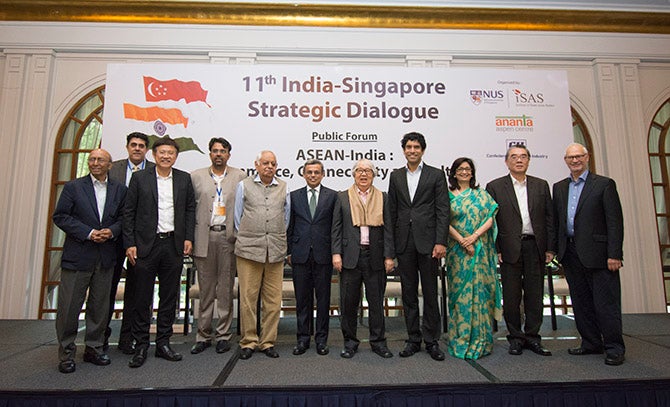
| Event Title: | 11th ISSD Public Forum |
| Topic: | ASEAN-India: Commerce, Connectivity and Culture |
| Date/Time: | 28 August 2018 | 10:00 - 12:30 |
| Venue: | Ballroom A, Level 1, Four Season Hotel Singapore |
| Speaker/s: | Multiple Speakers |
| Youtube: | https://youtu.be/nX2-Nf3slfs |

| Event Title: | ISAS Public Symposium |
| Topic: | ASEAN-India: Commerce, Connectivity and Culture |
| Date/Time: | 28 August 2018 | 10:00 - 04:18 |
| Venue: | Four Seasons Hotel, Singapore |
| Speaker/s: | Multiple Speakers |
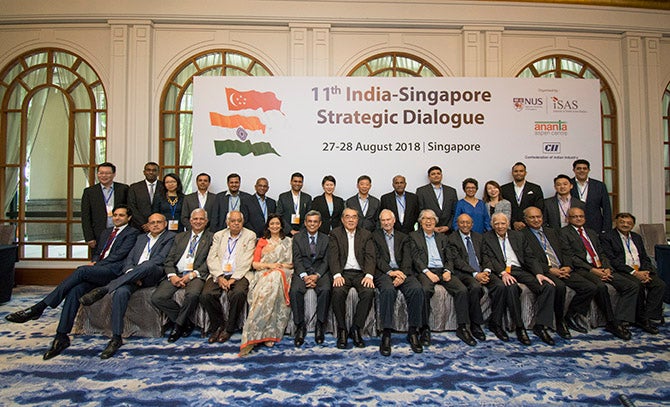
| Event Title: | ISAS Panel Discussion |
| Topic: | India-Singapore Strategic Dialogue 2018 |
| Date/Time: | 27 August 2018 | 15:30 - 04:18 |
| Venue: | Four Seasons Hotel, Singapore |
| Speaker/s: | Multiple Speakers |
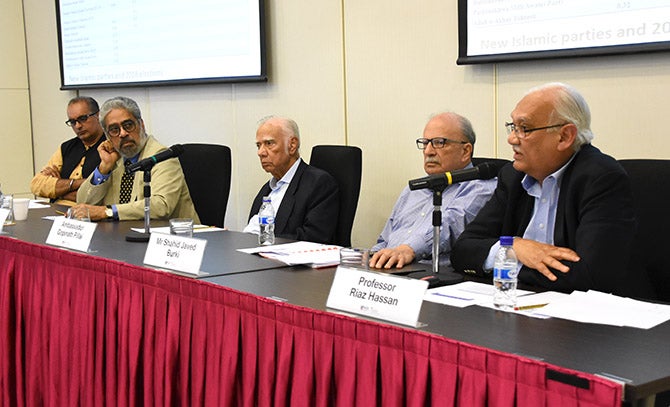
| Event Title: | ISAS Panel Discussion |
| Topic: | Pakistan under Imran Khan: A New Dawn? |
| Date/Time: | 23 August 2018 | 17:30 - 04:18 |
| Venue: | MEI Conference Room, Level 6, 29 Heng Mui Keng Terrace |
| Speaker/s: | Multiple Speakers |
| Description: | Ambassador Gopinath Pillai gave the opening remark speech by introducing briefly the speakers and their expertise. He then commented that while popular opinion seems to put Mr Imran Khan, Pakistan’s new Prime Minister in the same league as Pakistan’s military due to their support for him, Ambassador Pillai reckoned that Mr Khan has and would eventually show to his people that he has independent thinking and influence on the country’s future foreign policy and domestic reformations. This is also in view that Pakistan’s expansion of its allies, from the U.S. to China at present, has changed the dynamics of collaboration between these foreign allies and the Pakistan military.
Following, Associate Professor Iqbal Singh (Visiting Research Associate Professor) highlighted on the recent election in Pakistan in relation to emerging parties focusing on religion. For instance, he mentioned a small but emerging party known as Tehreek e Islami, which pushes for Pakistan to be governed by Sharia Law and is opposed against strong capitalism. This party won two seats which is not significant, nonetheless suggest a changing dynamics of intertwining religion and politics in the minds of Pakistan voters in recent years. Professor Riaz Hassan also weighed in on the strength of existing stakeholders within Pakistan. Illustrating by the sociological measuring of trust, Professor Hassan highlighted that among various public institutions, the Pakistan military still yields the greatest share of trust Pakistan’s population at large, followed by religious scholars and education institutions. At the other spectrum, the police and parliament yields the lowest trust. Whether this structure would face adjustments, would depend on Mr Khan’s new administration. Mr Shahid Javed Burki, however, proposed a visible transformation in Pakistan’s politics through Mr Khan’s victory. Mr Burki held that Mr Khan’s appeal to the urban youth population in Pakistan, is something that has not happened before in the past. This essentially shifts political support from the rural to urban, and this could likely give Mr Khan another term after this as social contracts with urban youths are being strengthened. Finally, on foreign policy stances, Professor Raja Mohan shared Pakistan’s likelihood of being non-revisionist in terms of adhering to existing Western-led institutions, under Mr Khan’s government. This means working more closely with the IMF, World Bank and its western ally, the United States, rather than solely relying on bilateral ties with China alone. The session then ended off with the question and answer session, in which some prominent themes, such as the strengthening Pakistan’s governing institutions were raised and answered by the panellists in a succinct manner. |
| Youtube: | https://youtu.be/IjXBdFKh9kE |
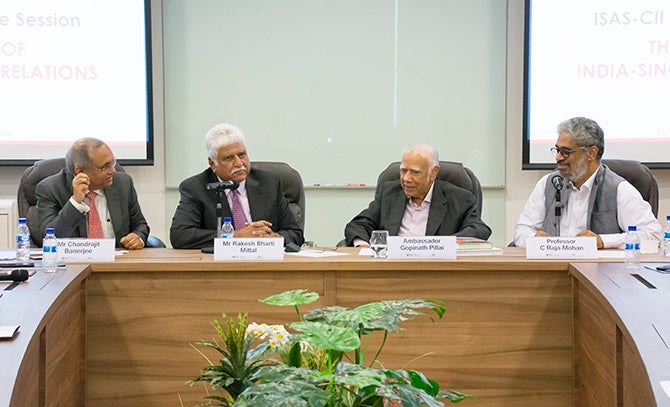
| Event Title: | ISAS-CII Closed Door Session |
| Topic: | The Future of Singapore-India Relations |
| Date/Time: | 21 August 2018 | 10:00 - 04:18 |
| Venue: | ISAS Board Room, Level 9, 29 Heng Mui Keng Terrace |
| Speaker/s: | Multiple Speakers |
| Description: | On 21 August 2018 ISAS researchers and delegates from the Confederation of Indian Industry (CII) met to discuss the future of India-Singapore relations. The 2-hours interactive session was moderated by Prof Raja Mohan, Director of ISAS. Amb Gopinath Pillai, Chairman of the Institute, and Mr Rakesh Bharti Mittal, President of the CII and Vice Chairman of Bharti Enterprises, delivered the opening remarks.
ISAS research staff and CII delegates exchanged views on current economic issues, India’s potential as a destination for Singaporean investments, and the state of RCEP negotiations. Chairman Pillai proposed to enhance ISAS-CII collaboration with a joint workshop to be held annually, as a platform for the two country to discuss each other’s realities and further strengthen ties. The proposal was welcomed by Mr Mittal and his fellow CII representatives, who praised ISAS’ commitment to produce policy-relevant work, and highlighted the importance reserved by CII not only to Business-to-Business interactions, but also to Business-to-Government and Business-to-Academia linkages. The conversation highlighted a number of relevant points. At the moment, the circumstances result favourable for Singapore-India partnership to step forward. It was agreed that the trade wars developing between China and the United States provide an excellent opportunity for investments to be diverted towards India. It was recognized that Singapore investors often struggle to see India as a comfortable and reliable destination for investments due to a “cultural shock”. Enhanced infrastructure and governance, soft-skills training as well as people-to-people contact will certainly be beneficial to improve the perception of India and bring the two countries closer. ISAS looks at CII as an important channel for Singaporean SMEs willing to find business partners in India. In addition to this, as stated by Mr Bharti Mittal, CII will soon release a code of conduct for SMEs and the banking sector. Innovation, education and the entertainment industry were mentioned as some of the sectors with highest potential for promoting economic cooperation between the two countries. With regard to the RCEP, it was highlighted how perceptions played a role in the evolving negotiations. ASEAN countries are concerned about RCEP developing outside the ASEAN framework, being often projected by India as an FTA with China. A change in India’s negotiating stance would certainly result beneficial to this regard. |
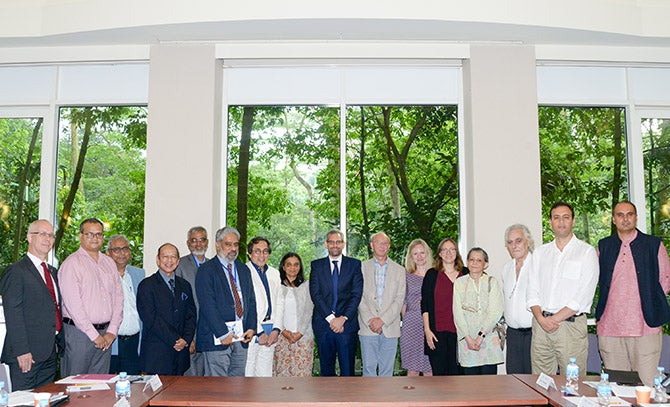
| Event Title: | ISAS-MEI Workshop |
| Topic: | Reflections on the Partition of India and Palestine after 70 years |
| Date/Time: | 15 August 2018 | 09:00 - 04:18 |
| Venue: | MEI Conference Room, Level 6, 29 Heng Mui Keng Terrace |
| Speaker/s: | Multiple Speakers |
| Description: | The “Reflections on the Partition of India and Palestine after 70 Years” workshop was a jointly organized by the Institute of South Asian Studies (ISAS), NUS and Middle East Institute (MEI), NUS. It brought together speakers from different parts of the world to analyse the partitions of British India and Mandate Palestine holistically and examine the tapestries such as the political leaderships, ideologies, laws, and institutions that connect them.
Mr Bilahari Kausikan, Chairman, MEI-NUS delivered the Welcome Remarks where he spoke about the intrinsic importance and significance of the topic to understand contemporary issues. He mentioned how “partition” is a harsh and loaded term compared to “separation”, and cited Singapore-Malaya as a successful case of “separation” whereby the two counties are not unweighted by emotional and historical baggage and complications. They get along fairly better than India-Pakistan or Israel-Palestine. In his introductory remarks, Professor C Raja Mohan, Director, ISAS-NUS highlighted the salience of partition in not only contemporary domestic politics in the Indian subcontinent but also in the inter-state relations. . He mentioned how the consequences of both India-Pakistan and Palestine-Israel partitions were so terrible and cataclysmic for the respective regions that the involved states still has not been able to come to terms and transcend their differences. He expressed the necessity for academic enterprises to make fresh enquiries into the multiple dimensions of the two partitions, and renew efforts to transcend its negativities. Next, in the Introductory Lecture titled “What is Partition?” Dr Victor Kattan defined partition as a form of statecraft that has been employed by different actors, in different contexts, at different moments, for different reasons. It is essentially a policy that leads to the division of territory to preserve order amongst great powers, often with the invocation of law in its practice. Therefore, it is not a strictly bilateral arrangement. In contrast, it is a hegemonic act of imposition by which territory is divided by a colonial, neighbouring, regional, or superpower or by a group of states acting in concert, perhaps through an international organization. He argued that while India and Palestine are the paradigm cases of partition, they were a part of a broader phenomenon Following the Introductory Lecture, the first panel discussion was on “The Partition of British India (August 1947)”. It was chaired by Dr Gyanesh Kudaisya. The first speaker was Professor Ian Talbot who re-examined the Lord Mountbatten’s Viceroyalty to address the question if the British were ‘reluctant partitionists’ and reasons that impelled them to pursue the Partition of British India. His presentation was followed by Professor Ayesha Jalal who drew on Saadat Hasan Manto’s literacies to present an intimate history of partition and its devastating consequences. She re-assessed the role and legacy of Jinnah in the partition of British India and contended that religion’s role in the partition has been overplayed by the scholars. She stressed that partition was the result of the failure to share-power between the political groups. The Question and Answer session that followed discussed the concept of multi-layered sovereignty and how partition continues to influence the people and inter-state relationships in postcolonial South Asia. The second panel was chaired by Dr Victor Kattan. It examined the Partition of Mandate Palestine (November 1947). The first panellist, Dr Penny Sinanoglou discussed how the 1937 Peel Commission report shaped conceptions of British plans to partition Palestine. The second presentation was by Dr Laura Robson on the role of the 1947 United Nations Special Committee on Palestine. The Question and Answer session that followed studied the different issues such as the domestic situation in Britain and lack of leadership in Palestine that influenced the Palestinian partition. It also addressed America’s role in the Zionist movement. The third panel discussion of the day was on “The Partitions of India and Palestine Compared”. It was chaired by Dr Iftekhar Ahmed Chowdhury and consisted of Dr Amrita Shodhan and Professor P R Kumaraswamy. While Dr Amrita Shodhan’s paper examined whether and/or how we can make sense of the connections between the two places of Mandate Palestine and British India, Professor P R Kumaraswamy expounded on India’s dilemma of pragmatism vs. principles i.e. Nehru’s preference for a partitioned India but a federal Palestine. The Question and Answer session delved into how the differences between communities were politicised and constructed as irreconcilable. It also noted that processes and outcomes of different partitions are contingent on their respective contexts and contingencies. The last panel explored the consequences of Partition for South Asia, the Middle East and beyond. The panellists for the session were Dr Iqbal Singh Sevea and Dr Mohamed-Ali Adraoui. It was chaired by Dr James M Dorsey. Dr Iqbal discussed how social identities in South Asia, particularly in Punjab, was impacted by the Partition. He explored the two rebellious figures of Punjabi folklore-Maula Jatt and Dulla Bhatti- and related them with the history and politics of Pakistan. Dr Mohamed-Ali explored the impact of the Palestinian partition on Islamist movements, particularly the Muslim Brotherhood. The Question and Answer session discussed why the Palestinian cause as a mobilising factor is so salient in transnational Islamist movements. It also raised the concept of “caste” in non-Hindu religions in the Indian sub-continent and the how colonial labelling and categorisation of different communities also moulded the latter’s identities. |
| Youtube: | https://youtu.be/MfI4xp47pAc |
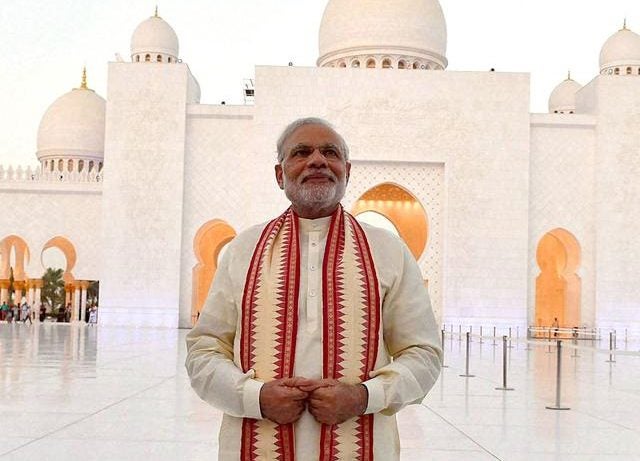
| Event Title: | ISAS-MEI Joint Seminar |
| Topic: | India and the Gulf: Modi turns West |
| Date/Time: | 14 August 2018 | 15:00 - 04:18 |
| Venue: | ISAS Board Room, Level 9, 29 Heng Mui Keng Terrace |
| Speaker/s: | Prof P R Kumaraswamy |
| Description: | The Joint ISAS-MEI Seminar: "India and the Gulf: Modi turns West" by Prof P R Kumaraswamy was held on 14 August 2018. The session discussed how India’s Prime Minister Narendra Modi has been trying to enhance Indo-Gulf relations through an economy-development centric approach. The speaker shared that India has generally neglected the Gulf even though the region is its largest trading partner, remittance contributor and home to the largest population of its migrants in the world. He attributed India’s lack of a regional policy towards the Middle-East to its view of the region through the Pakistani prism and the absence of expertise on the region in India. He posited that the Modi government is abandoning India’s traditional transactional attitude and forging closer strategic partnership with Gulf countries, especially with Saudi Arabia and the United Arab Emirates (UAE). He made particular mention of the potential of UAE to be a regional power and how Indian could utilise this and anchor its engagements with the small nation in shared interests. Additionally, he touched on existing intra-regional tensions and differences i.e. the Arab-Iran rivalry, India-Pak tensions, China’s increasing footprint in the region and so forth, and mentioned how it’s important to carefully circumvent problematic issues and work on mutually beneficial matters. He also highlighted the necessity for India to build capacity to actualise Modi’s imagination of the relationship he wants to forge with the Gulf. |
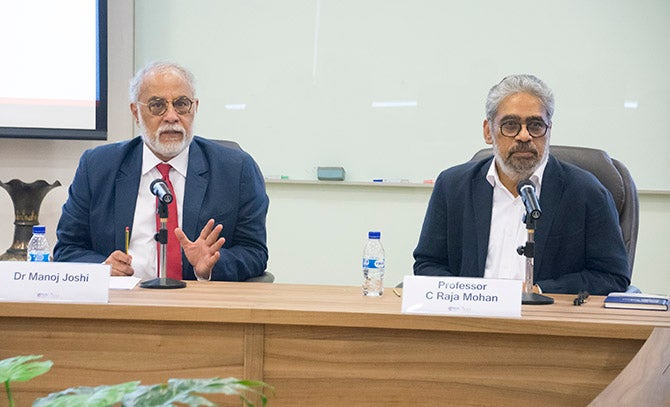
| Event Title: | ISAS Seminar |
| Topic: | Sino-Indian Relations after the Wuhan Summit |
| Date/Time: | 07 August 2018 | 15:00 - 04:18 |
| Speaker/s: | Dr Manoj Joshi |
| Description: | During the Wuhan Summit, both the Chinese and Indian Press releases emphasized on the respective countries’ maturity and wisdom to handle differences to peaceful discussions.
An informal meeting, the Wuhan Summit had two key purposes. Firstly, the Summit served to put strategic communication or high level interaction between the two countries on a new platform. Despite bilateral meetings taken place regularly on a routine basis between different ministers hailing from both sides, the summit have done differently by creating a new era of diplomacy where the two top leaders meet more frequently – in a much greater detail where they are free from the constraints of protocol. Secondly, the summit served to create a higher level of intensity of talks between India and China, one that covers a great deal of ground while implementing a better understanding of different perspectives of development. The Wuhan Summit had produced several results. On the surface level, both India and China were able to present to the world their maturity to understand their pessimistic bilateral relations, yet possess the political will to do something about it. Next, it signifies a turning point and the beginning of a new process of a bilateral relationship, just as the ones established by Rajiv Ghandi in 1988 and Atal Bihari Vajpayee in 2003. On the practical level, it presents the commitment by both sides to build a common understanding on overarching issues of bilateral and global importance, while they are also independent of third parties’ influence on their respective foreign policies. Immediate results could be seen from the setting up of an India-China military operational hotline to facilitate communication. The Indian army was also instructed to avoid any form of excessively aggressive patrolling tactics on the border as well. Both countries highlight the importance of special representatives, as the two countries seeks a fair, reasonable and mutually acceptable settlement to the border question. Prior to the Wuhan Summit, Sino-India relations were both progressing and deteriorating. Both Prime Minister Modi and President Xi, after coming into office, focused on economic issues. The developmental partnership between the two countries in 2014 is an example of that focus, building upon an earlier strategic partnership established by Wen Jiabao in 2005. However, signs of a troubled relationship was long present, as the two countries get entangled in an actual faceoff over China’s audacious move to build a road in Arunachal Pradesh. Further Chinese involvement in distressing its relationship with India includes the establishment of China-Pakistan Economic Corridor in April 2015; China blocking off Indian efforts to join the Nuclear Suppliers Group in May 2016 – despite Modi personally requesting support from China; and again China blocking Indian efforts to the United Nations to place Pakistani terrorist Masood Azhar on the 1267 sanctions list. India was as guilty as the Chinese, with the Tibet issue often coming into picture and creating a displeased China. The Doklam issue on June 2017 was the most significant and recent case study prior to the Summit. Yet the crisis was diffused due to the increased in Modi-Xi level meetings. Side-lined meetings were held by top officials from both sides during the G20 summit and BRICS Summit in July 7 and 27 respectively, as it creates a breakthrough in Sino-India relations, with both Modi and Xi giving special instructions to their special representatives to come up with the idea of an informal summit – the subsequent Wuhan Summit. As the build-up to the Summit continues, India had committed to, firstly, “stop playing the Tibet card”, and secondly to not get militarily involved in Maldives. Despite the fierce confrontation between the respective armies in Doklam, Sino-India cooperation was seen to have taken on another step forward just months after the crisis. The Wuhan Summit, however, showcases the failure of the existing confidence building measures regime established by both countries. Existing examples such as the Border Peace and Tranquillity Agreement signed in 1993; Protocols on Modalities for Implementation on Confidence-Building Measures in 1996 and 2005; Working Mechanism for Consultation and Coordination in the Indo-China border affairs in 2012; and the Border Defence Cooperation Agreement in 2013 were all seen to have failed upon the Doklam Crisis. These agreements lacked of substance, and the crisis highlighted this fact. Looking ahead, even though most observers viewed this Summit as a tactical move, rather than a strategic one, there is no reason to assume that there will not be any lasting results with regards to strategic gains. Despite the odd nature of Sino-India relations that has pushed forth this Summit, the essence of the meeting was not meant to be of any strategic value. Yet, some lasting strategic gains could be achieved, beyond the tactical issues of keeping peace in the Line of Control, as both leaders are seen to be responding to the rapidly changing geopolitics of the Indo-Pacific region. Also, with the failures of previous agreements resulting to the Wuhan Summit, a stronger summit-level interaction would be construction from both sides. Fortunately, the leaders and top ministers from both sides have initiated such regime, with the Indian Defence and External Affairs ministers preparing to depart for Beijing while the Chinese Defence minister is expected in India this year. President Xi has mentioned in the BRICS Summit that he will be meeting Prime Minister Modi again this year, and visits of military delegation has resumed after a two year gap. Regarding India’s future, there is a need for the country to maintain a balance in the competitive and cooperative relationship with China. This is where the United States come into play, as India look to deepen its ties with the U.S. in order to maintain the balance of power with China. India is ready to sign a communication and security agreement with the U.S. – which will step up their military cooperation, and the first India-U.S. 2+2 dialogue will be held in New Delhi later this September. In conclusion, engaging China enables India to prevent zero-sum outcomes relating to China in the immediate neighbourhood in the South Asian region. While there is no doubt that China will continue to involve itself in the region, engagement can make sure these processes will not undermine India’s security interests. With India already doing its part to improve bilateral relations with China with regards to Tibet and Maldives, India had also further prove its commitment to the Chinese by not inviting Australia in the latest Malabar exercise. Consequently, concessions from the Chinese will be created as well. While diplomacy should not be conducted in the public stage, the coined term Megaphone Diplomacy, appears to prove otherwise. The Wuhan Summit, has however, returned the diplomatic discretion of any engagement between the two sides. Consequently, future decisions made and cooperation will be done without any external influences that could exacerbate existing problems. More joint projects with other countries along with India and China could also be realised. During the Q&A, a total of 17 questions were asked. Questions ranged from whether India is seen to have “sold out” its own interests to China, and whether the current situation in the aftermath of the Summit is more of a process and rather than of substance. One questioned whether India is trying to do too much despite China not giving a lot in return. Also, another questioned whether the Doval Doctrine is mutually exclusive to the strategic interests of India today. |
| Youtube: | https://youtu.be/hRfhx4ojHn0 |
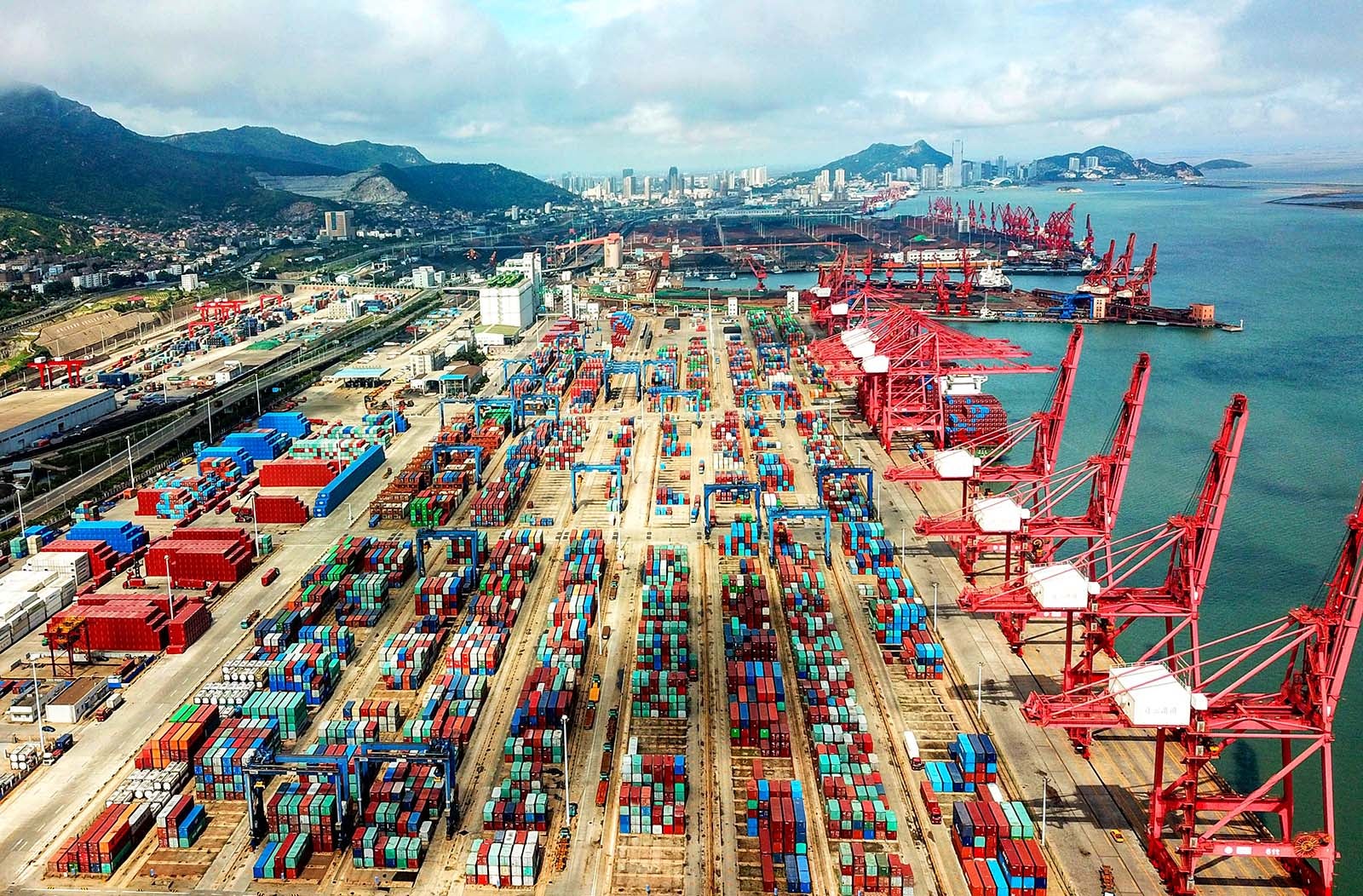
| Event Title: | ISAS Joint Panel Discussion |
| Topic: | The Global Trade War: Implications for India, China and the Region |
| Date/Time: | 02 August 2018 | 15:00 - 04:18 |
| Venue: | MEI Conference Room, Level 6, 29 Heng Mui Keng Terrace |
| Speaker/s: | Multiple Speakers |
| Description: | Professor C Raja Mohan, Director of the Institute of South Asian Studies, NUS, chaired the panel discussion titled ‘The Global Trade War: Implications for India, China and the Region’. Members of the panel discussion were Mr Lee Yi Shyan (Chairman, Business China), Mr Dustin Watson (Director, Asia Business Trade Association), Mr Eduardo Pedrosa (Secretary-General, Pacific Economic Cooperation Council) and Dr Amitendu Palit (Senior Research Fellow and Research lead, ISAS). Ambassador Gopinath Pillai (Chairman, ISAS and Ambassador-at-Large, MFA) opened the session by mentioning the timeliness of the panel discussion in allowing us to contribute to the discussion while it was still evolving. He also highlighted the salience of the topic, as it had implications on every region, especially Southeast Asia.
Professor Mohan began the panel discussion by assessing the consequences of a trade war on domestic politics and the political future of President Trump and President Xi. He also elaborated on the intra-western contradictions that were taking place between the United States (US) vis-à-vis the European Union (EU) and the NATO. Mr Lee began by providing a summary of the trade war thus far. He shared that the trade war will be a double-edged sword which will hurt both China and the US firms involved in China through the supply chain. He gave the example of Apple Inc., where 538 out of its 900 plants are located in China, to emphasise how the trade war will hurt both parties. He also stressed his belief that while China will be able to ride through the war, President Xi’s goals to be moderately developed by 2035 and a superpower by 2050 will push him to find ways to avoid the trade war. Mr Watson chose to assess the trade policy through a more political lens rather than an economic one. He highlighted that the trade war rhetoric will not decrease before the midterm elections in November. He stated that the trade war is viewed as an attempt to maintain house and the republican majority in the senate. He also speculated that the trade war could cool down after November if President Trump maintains the house and senate. Mr Pedrosa provided a lot of data from the surveys that the Pacific Economic Cooperation Council has conducted. A survey on perceived risks to global trade showed that the highest risk was increased protectionism. His data also showed that 52% had a negative assessment of the political environment for freer trade. He concluded that it was important to keep assessing the World Trade Organisation (WTO) and other regional efforts to see how they fit into multilateral arrangements. Dr Palit looked more specifically at India and mentioned that India officially joined the trade war by announcing retaliatory measures on 29 items that it imports from the US. He posited that the trade war is just the beginning and that it will widen beyond tariffs. An example he gave was the extension of section 232 into the H1B visa restrictions. The audience asked a wide array of questions ranging from issues of increasing disparities to potential collaborations within Asia. However, the main overriding question was the impact of the trade war, and there was a general consensus that the shock will be good for the system. Mr Watson suggested that the shock to the system will allow for change and will stir discussion within the WTO to make countries play fair and by the rules. Mr Lee concurred and added on that the shock could also spur more plurilateral agreements, a point that Mr Pedrosa earlier raised. |
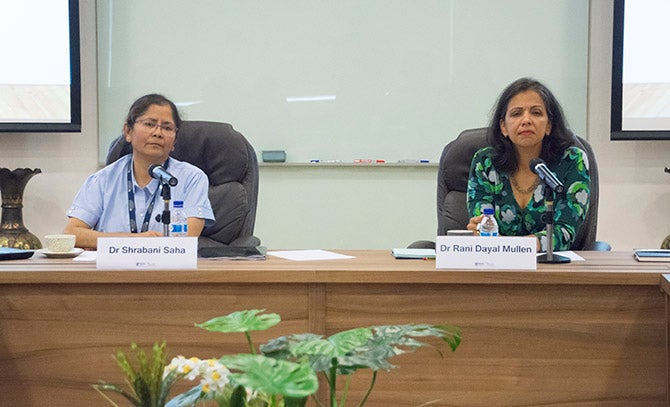
| Event Title: | ISAS Seminar |
| Topic: | Is Corruption Growth-Enhancing in Autocracies? |
| Date/Time: | 31 July 2018 | 15:00 - 04:18 |
| Venue: | Board Room, Institute of South Asian Studies |
| Speaker/s: | Dr Shrabani Saha |
| Description: | Corruption is a key aspect of most societies around the world, including that of South Asia. It has been regarded as a major bottleneck of growth and development for these societies. Over the years, there have been numerous policies and efforts put forth by various stakeholders to tackle this key problem. The beginning of the 1980s saw the introduction of greater empirical study and research on this topic. Economist Paolo Mauro’s work titled ‘Corruption and Growth’ published in 1995 can be regarded as the pioneer paper on the study of corruption and economic growth. In this paper, Mauro argues that corruption creates mostly negative impact on investments which are a major engine of economic growth. Dr Saha also highlighted other well-known studies that were carried out by scholars like Reinikka and Svensson in 2003 that explore other channels like human capital and misallocation of resources that have had negative impact on economic growth. She also emphasised that as corruption is a secretive activity, investments usually go to avenues that have lesser transparency in the government such as education and healthcare. In countries that have high rates of corruption, there are less investments in such areas and instead more investments in areas like infrastructure.
Dr Saha a highlighted two other major schools of thought that has been present in literature in explaining the positive and negative effects of corruption on growth and development. These two schools of thought have also been explored greatly in depth in her research analysis. |
| Youtube: | https://youtu.be/ZEh1Yp31EYg |
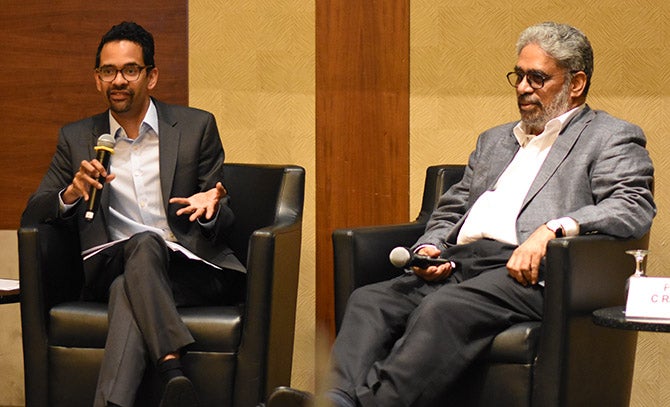
| Event Title: | ISAS Public Lecture |
| Topic: | The Bay of Bengal: History, Memory and the Future |
| Date/Time: | 05 July 2018 | 16:00 - 04:18 |
| Venue: | Left Chamber, Level 1, NUSS Guild House |
| Speaker/s: | Prof Sunil Amrith |
| Description: | Professor Sunil Amrith, Mehra Family Professor, Professor of History, Harvard University, and Academic Visitor of the Asia Research Institute gave a Public lecture on the Bay of Bengal: History, Memory and the Future. The ‘Question and Answer’ session was chaired by Professor Raja Mohan, Director, Institute of South Asian Studies, NUS.
During his address, Professor Mohan mentioned about how the Burma China and India Theatre and Second World War were overlooked perspectives of history as they seemed so remote from geopolitics when it reality it was not the case. He also spoke about the Bay of Bengal functioning as a strategic backwater. During his lecture, Professor Amrith mentioned about how after decades of neglect, the Bay of Bengal is now gaining strategic and economic importance. He also provided further insights on how Singapore, much more than Calcutta came to be the heart of the Bay of Bengal. Historical connections under the backdrop of the South Asian diaspora were reiterated through Professor Sunil Amrith’s sharing about the flourishing of print culture among the Tamil, Telugu and Bangla languages. Professor Amrith also spoke about the Roja Mutthaiya library which had Tamil publications. He further elaborated about the Tamil and Telugu speaking diaspora who had settled down in different part of Southeast Asia. Professor Amrith mentioned on how there was an increasing trend of migrations across the Bay of Bengal in the 1950s with the entry of Telugu porters from the Tungabhadra dam who were also Burma refugees. Professor Amrith also touched on the religious aspect of the Bay of Bengal. He went on to elaborate further about how scholarship was reviving the Indian Ocean as a geopolitical concept via taking advantage of kinship understandings and cultural links that also involved the religious tenets of Hinduism and Buddhism in South and Southeast Asia. For instance, the Sri Lankan Buddhist leader Anagarika Dhammapala revived Theravada Buddhism via the establishment of the Maha Bodhi Society in India. Profesor Amrith also stated that the Bay of Bengal’s crucial role in international politics was evident from India’s initiative of Project Mausam. It was described as a peaceful zone of cosmopolitan commerce. Professor Amrith also spoke about the arena of strategic competition between two rising powers that has formed in maritime. The idea of the Bay of Bengal emerging as a strategic point in light of the China’s Maritime Silk Road was also brought to attention by him. The lecture was concluded with the emphasis on the Bay of Bengal becoming a major area of research in academia given its primarily economic nature of integration under the context of diasporic connections that form the crux of migration, citizenship and identity. |
| Youtube: | https://youtu.be/PVd-chBvcvY |

| Event Title: | ISAS Book Launch & Panel Discussion |
| Topic: | Seven Decades of Independent India: Ideas and Reflections |
| Date/Time: | 03 July 2018 | 16:00 - 04:18 |
| Venue: | Capricorn Ballroom, Level 1, Marina Mandarin Hotel |
| Speaker/s: | Dr Janil Puthucheary |
| Youtube: | https://youtu.be/qLY9-cQyEXc |

| Event Title: | ISAS Closed Door Session |
| Topic: | India’s Agrarian Distress and its Economic and Political Implications |
| Date/Time: | 02 July 2018 | 14:00 - 04:18 |
| Venue: | ISAS Board Room, Level 9, 29 Heng Mui Keng Terrace |
| Speaker/s: | Dr Ashok Gulati |
| Description: | The Seminar by Dr Ashok Gulati, Academic Visitor to the Institute of South Asian Studies, NUS and Infosys Chair Professor for Agriculture, was chaired by Professor C Raja Mohan. Dr Gulati mainly discussed about the agrarian distress that has been affecting the whole of South Asia, its implications on the social, political and economic landscape on the region and measurements to tackle this crisis in the long term. He also shared his insights on the how the current measurements can be improved and made sustainable for long term progress in the industry.
Agriculture is one of the most important industry for the whole of South Asia, especially India. According to the 2011 census, 54% of the workforce are engaged in such farm-related work. It is the main source of income and livelihood for many in the rural and even urban areas. More importantly, agriculture production has been seen to have a multiplier effect on other industries such as services as well. For example, while in India, agriculture directly contributes to about 16% of the Gross Domestic Product (GDP), because of the fact that the food and beverage industry depends largely on agricultural products for sales, agriculture can actually contribute up to 25-30% of the GDP. As such, it is important to ensure that the government devotes enough resources and designs effective policy reforms to ensure that this industry is able to sustain itself. From 2002-2014, the state of Gujarat where Mr Narendra Modi served as the Chief Minister, registered the highest rate of agricultural growth amongst all other states at 8% per annum which was unheard of in Indian history. The main driver of this growth came from the cotton revolution. During this period, Monsanto, a multinational agrochemical and agricultural biotechnology corporation helped to develop the BT cotton trade that brought in many profits. The success of the agriculture sector in Gujarat, mainly in the Saurashtra region, during this period manifested into political gains for Modi who managed to retain his power for three consecutive terms. However, over the last 4 years, this situation has changed drastically. Owing to the massive agrarian crisis in many parts of Gujarat, many farmers have become increasingly dissatisfied and frustrated with the government. This has been reflected during the Gujarat elections in 2017 where Mr Modi lost power over the Saurashtra region. The case of Gujarat is a classic micro-state level example of the spill over effect of the agrarian distress onto the political landscape. |
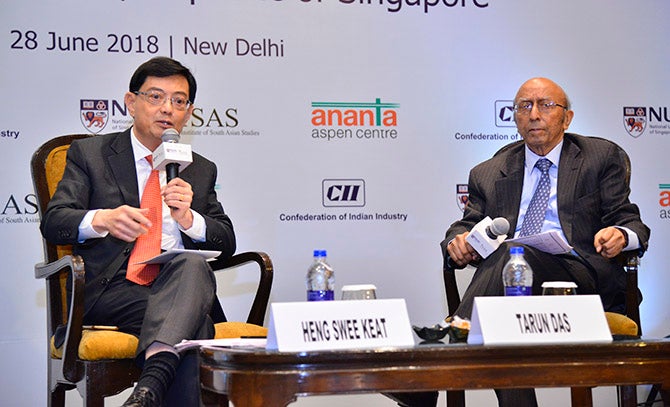
| Event Title: | Singapore Symposium 2018 |
| Topic: | Interactive Session with Mr Heng Swee Keat |
| Date/Time: | 28 June 2018 | 15:00 - 04:18 |
| Venue: | New Delhi, India |
| Speaker/s: | Mr Heng Swee Keat |
| Youtube: | https://www.youtube.com/watch?v=DvMyprysY_w |
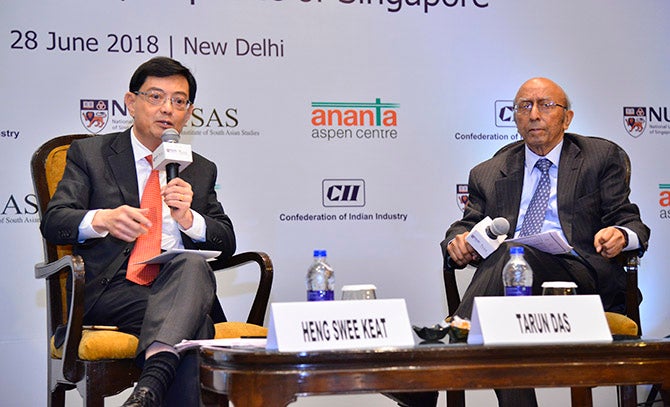
| Event Title: | ISAS-CII Closed Door Session |
| Topic: | In-Conversation with Mr Heng Swee Keat |
| Date/Time: | 28 June 2018 | 15:00 - 04:18 |
| Venue: | Bombay, India |
| Speaker/s: | Mr Heng Swee Keat |
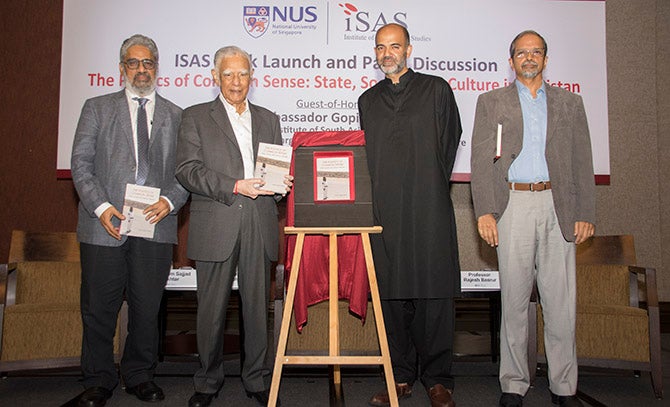
| Event Title: | ISAS Book Launch & Panel Discussion |
| Topic: | The Politics of Common Sense: State, Society and Culture in Pakistan |
| Date/Time: | 19 June 2018 | 15:00 - 04:18 |
| Venue: | Ballroom 3, Level 3, Orchard Hotel Singapore |
| Speaker/s: | Dr Aasim Sajjad Akhtar |
| Youtube: | https://youtu.be/VPSclbXs5n4 |
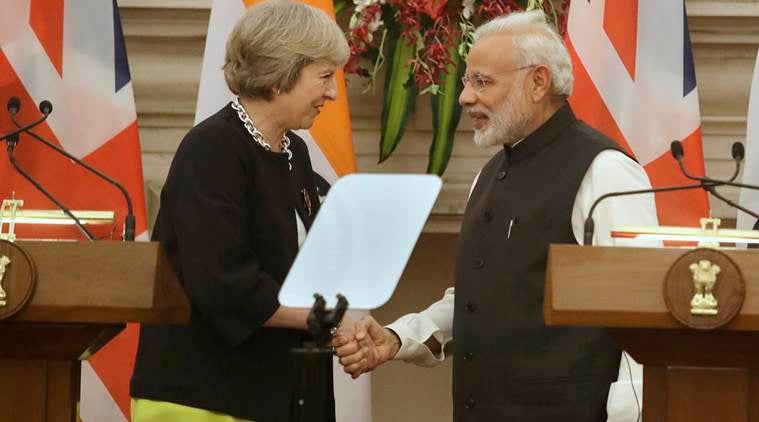
| Event Title: | ISAS-UOP Workshop |
| Topic: | India-UK Trade and Societal Challenges:Current Trends and Post-Brexit Prospects |
| Date/Time: | 14 June 2018 | 09:00 - 00:00 |
| Venue: | Portsmouth, United Kingdom |
| Speaker/s: | Multiple Speakers |
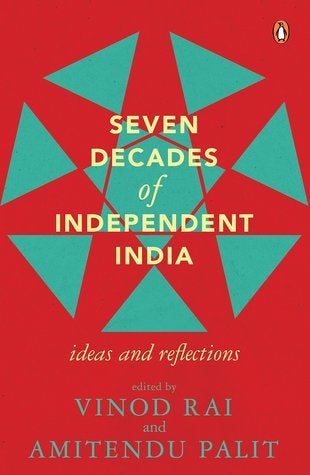
| Event Title: | ISAS-LSE Joint Panel Discussion |
| Topic: | Seven Decades of Independent India: Ideas and Reflections |
| Date/Time: | 12 June 2018 | 09:00 - 04:18 |
| Venue: | London, United Kingdom |
| Speaker/s: | Multiple Speakers |
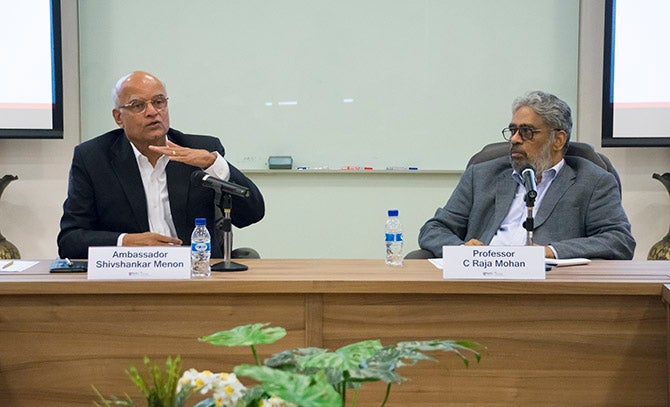
| Event Title: | ISAS Closed Door Session |
| Topic: | Changing US-China Relationship: Impact on Asian Geopolitics |
| Date/Time: | 08 June 2018 | 10:30 - 04:18 |
| Venue: | ISAS Board Room, Level 9, 29 Heng Mui Keng Terrace |
| Speaker/s: | Amb Shivshankar Menon |
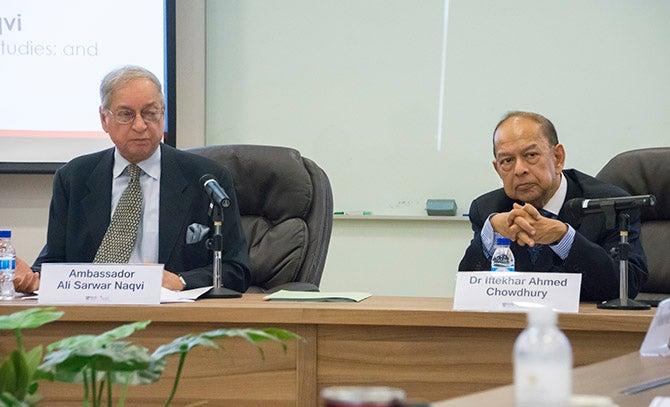
| Event Title: | ISAS Seminar |
| Topic: | Pakistan’s Foreign Policy: Current Issues |
| Date/Time: | 05 June 2018 | 10:30 - 04:18 |
| Venue: | ISAS Board Room, Level 9, 29 Heng Mui Keng Terrace |
| Speaker/s: | Amb Ali Sarwar Naqvi |
| Description: | Ambassador Ali Sarwar Naqvi, Executive Director, Centre for International Strategic Studies and Former Ambassador of Pakistan was invited to speak at a seminar titled ‘Pakistan’s Foreign Policy: Current Issues’. The seminar was part of the Ambassador’s Series, spearheaded by Dr Iftekhar Chowdhury. He opened the session and noted Ambassador Naqvi’s successful diplomatic career and vast experience representing Pakistan. The seminar was attended by the High Commissioners of Pakistan and Bangladesh, as well as other distinguished guests and ISAS Staff.
Ambassador Naqvi began his presentation by discussing Pakistan’s domestic situation and highlighted that the country had made great strides in strengthening democratic institutions, and elections were slated to take place in July this year. He then discussed the country’s foreign relations and challenges. He emphasized that the current issues in Pakistan’s foreign policy could be traced back to the 9/11 attacks in the US, the subsequent war in Afghanistan and its spill over into Pakistan. He next discussed the strained US-Pakistan relations in the context of present-day geopolitics and global power plays and tied these into relations with India – another challenge to Pakistan’s foreign policy. Ambassador Naqvi highlighted India’s refusal to engage and persistent focus on Pakistan’s alleged sponsorship of terrorism as the key reasons for a stalemate in relations. He reiterated that Pakistan wanted to focus on bilateral talks and ‘plucking low-hanging fruit’ to lay the groundwater for more difficult conversations on terrorism and Kashmir. Ambassador Naqvi ended his talk by touching on Pakistan’s strong relations with China and developing ties with Russia. The audience asked a variety of questions. In response to a question about relations with Iran and Saudi Arabia, Ambassador Naqvi noted that Pakistan wished to stay neutral in the sectarian nature of conflict enveloping Middle East. Giving the example of the Iran-Iraq war from 1980-1988, he explained that Pakistan had tried mediation in the conflict but remained impartial. Similarly, at present he noted that Pakistan had enduring ties with Saudi Arabia but was equally mindful of its strong geographical, religious and cultural affinity with Iran. Other questions regarding ISAF in Afghanistan and the recent remarks of former Prime Minister Nawaz Sharif about Mumbai attacks were also discussed. |
| Youtube: | https://youtu.be/osfmoqF4knE |
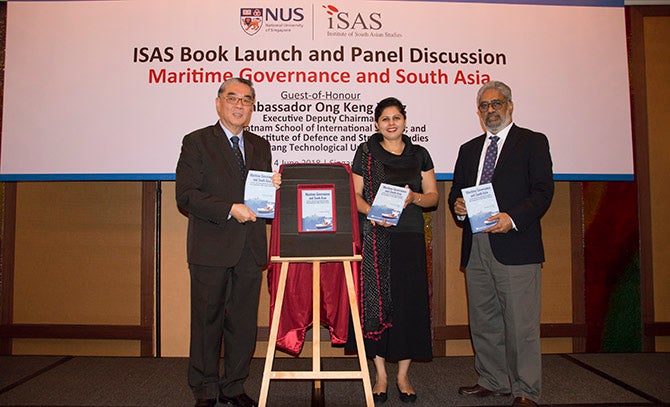
| Event Title: | ISAS Book Launch & Panel Discussion |
| Topic: | Maritime Governance and South Asia |
| Date/Time: | 04 June 2018 | 15:00 - 04:18 |
| Venue: | Capricorn Ballroom, Level 1, Marina Mandarin Hotel |
| Speaker/s: | Dr Jivanta Schottli, Amb Ong Keng Yong |
| Youtube: | https://youtu.be/Cey6KLrb6Jk |

| Event Title: | ISAS Closed Door Session |
| Topic: | An Update on Pakistan’s Key Relationships |
| Date/Time: | 01 June 2018 | 15:00 - 04:18 |
| Venue: | ISAS Board Room, Level 9, 29 Heng Mui Keng Terrace |
| Speaker/s: | Amb Riaz Khokar |
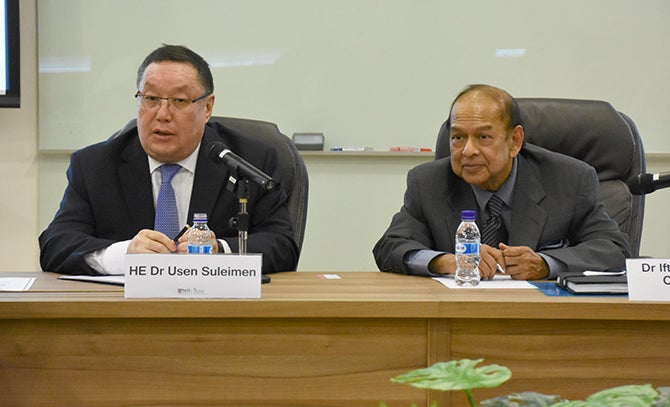
| Event Title: | ISAS Ambassadors’ Lecture |
| Topic: | Kazakhstan and China’s Road Belt Initiative: Implications for the Region |
| Date/Time: | 17 May 2018 | 15:00 - 04:18 |
| Venue: | ISAS Board Room, Level 9, 29 Heng Mui Keng Terrace |
| Speaker/s: | Amb Dr Usen A. Suleimen |
| Description: | The Seminar by Dr Usen Suleimen, Ambassador of Kazakhstan to Singapore, was chaired by Dr Iftekhar Chowdhury. Amb Suleimen mainly talked about Kazakhstan’s economy, its evolution from the Soviet period to today and its current goals and potential. He spent the last part of his presentation to talk about Kazakhstan’s engagement in the BRI.
Economic policy_Kazakhstan’s stance in economics and politics is a pragmatic one. The country follows the motto “Economy first, politics second”, derived from Lee Kwan Yew’s doctrine. LKY visited the country just before the collapse of the USSR and the re-foundation of Kazakhstan as an independent country. Nazarbayev, today leading the country as its President, during that meeting “learnt capitalism very quickly” (cit.), and from independence has made Kazakhstan to replicate many Singaporean features and institutions (e.g. Tamasek, SBF, IE…). Under the presidentship of Nazarbayev in 25 years the country has achieved incredible milestones from the point of view of economic development, becoming the leading economy in Central Asia. Kazakhstan is the most remote country in the world from the sea, however is rich in all minerals: number one producer of uranium, second in zinc and copper, great producer also of wheat, grains, fine cotton. 70% of the country’s income derives from sell of crude oil. During Stalin’s regime, raw materials were sourced from non-Russian Soviet republics (like Kazakhstan), while factories for their transformation were only in Russia. This had two aims: 1) to perpetuate dependence of Soviet republic from Russia; 2) to artificially create jobs: the distance between sources and factories implied the need of transportation routes and services. When the USSR collapsed, all satellite republics found themselves with no infrastructure. However today Kazakhstan managed to (partially) fill the gap; it has many industries which were not there in Soviet era. The development strategy “Kazakhstan 2030” was completed in 2012; now the country is working on the implementation of “Kazakhstan 2050”, a strategy whose name translated in English means “Bright path/ Bright future”. This is the most recent economic policy of the country, aimed at making Kazakhstan join the group of 30 developed countries by 2050. The country has been ranked the 36th in term of ease of doing business. Its GDP growth was 4% in 2017. Due to good inflow of petro-dollars, Kazakhstan was able to buy the best technology available in the world. It has built a new city, then became the new capital, Astana, in 14 years. Ethnic policy_Kazakhstan successfully avoided the ethnic instability which affected (and still affects) many post-soviet nations. It is a multiethnic country: in it 130 different ethnic groups co-exist, with different their confessions (Islam, Orthodox/Catholic Christianity, Judaism, Buddhism). It never experienced episodes of racial tension after independence. It has historically received many refugees (religious/political) in correspondence of different historical events and from different parts of the world. (ex: adoption of orphans during WWII by every Kazakh family). Originally Kazakhs were worshippers of the Sky, then became Zoroastrians, then were converted to Islam by the Arabs. They maintain their nomad heritage in their lifestyle and culture (hospitality is a core value; it derives from the fact that Kazakhs used to live isolated in the steps, and travellers were seen as source of news from the outside world). Kazakhstan is today a Muslim but secular country. Nazarbayev created the “Congress of the leaders of world and traditional religions”, aiming at transforming this organization in a sort of UN of religions, to be headquartered in Kazakhstan (Israel and Iran have joined already). Economic outreach_He also created the Eurasian Economic Union (EEU), aiming at becoming a sort of European Union of Central Asia. The members countries are all Muslim, neighbouring, and speaking languages from the Turkic group. It took 22 years to the countries to agree on the 8-pages declaration of creation of the EEU. Today the EEU already has a FTA with Vietnam, and is negotiating one with Singapore (possibly to be conclude next year), China, Korea, India. The EEU is a vital issue for Kazakhstan, in particular because of its ability to boost FTAs. Kazakhstan has a lot of surplus production of wheat, which is exported both as grain, and as vodka (ex: vodka exported to Vietnam). So far, relations with Southeast Asia have been limited, because Kazakhstan did not have resources and time to do so. However, it is now working on strengthening those relations. Various Singapore companies and engineering consulting groups are already active in Kazakhstan (Mentioned George Yeo). In this sense, the BRI helped to “opening to each other”. The Nazarbayev government also created the Astana International Financial Centre, prototype of the other world financial centres, aiming at filling the gap for Eurasia. It aims at becoming a financial hub (like London, Wall Street, Singapore, Hong Kong, etc) and also at facilitating the BRI implementation. Foreign policy_After independence, Kazakhstan got from the USSR an “important inheritance”, that of nuclear weapons (it had the 4th largest nuclear arsenal in the world). However, as a goodwill sign to prove its peaceful stance in international relations, it renounced to it, giving an important contribution to non-proliferation and disarmament. (He mentioned that Libya and Palestine tried to persuade Kazakhstan not to renounce to the nuclear arsenal, since the country could have been used as a shield by Middle-Eastern Muslim nations against Israel and the US; to do so offered equivalent of ¼ yearly GDP; but Kazakhstan did not accept). This contributed to make Kazakhstan the 2017-18 non-permanent member of the UNSC, a matter of great pride for the government. In Soviet era, Kazakhstan was a testing area for the URSS, and still today it bares the consequences of this (children born with deformities, etc). In 2016 it has created the Bank for low enriched uranium under the IEIA, to support the civil use of nuclear power. Contribution to multilateralism and peace_ During the Ukrainian crisis, Kazakhstan invited Russia, Ukraine, Belarus President to meet. It hosted 2 rounds of negotiations in Almaty for the Iranian nuclear deal. It acted as a mediator during the recent Turkey-Russia diplomatic tensions. It hosted 9 rounds of negotiations on Syria (Tokyo, Iran, Russia and others). On the BRI_Kazakhstan in a fundamental part of the BRI (a considerable portion of the corridor goes through Kazakhstan). The BRI will provide the country with 5 bln USD per year. This will facilitate Nazarbayev government in its endeavour of filling the infrastructure gap which Kazakhstan has inherited from the Soviet era (see above). The BRI comes at a good moment in time: the pragmatism and vision of Kazakhstan’s Nazarbayev corresponded with those of China’s President Xi. Indeed, just before the BRI had been announced (that too, in Kazakhstan), Kazakhstan had already started its new economic policy “Bright Future” (see above). At the moment, both Kazakhstan and China have completed their respective sections of the “Western China-Western Europe” path of highways. Russia needs to complete its section. One of the drawbacks of BRI is that on the wayback containers will travel empty. Kazakhstan, being placed at the mid-way, can re-load the containers. This is one possibility which deserves some consideration. It can also benefit Southeast Asia, creating a link for goods transportation between SEA and Europe. Amb Suleimen shared few details on the following areas under development within the BRI framework: “Trans-caspian international transport route”; “Baku-Tbilisi-Kars line”; “Khorgos special economic zone”; “Kazakh-Chinese joint territorial in Lianyungang”; “Kuryk infrastructure” near Aktaj port. (for more details refer to the slides). Few days ago in Sochin Nazarbayev re-proposed (he had already done it in 2016) the Central-Asian Canal, which would link the Caspian Sea and the Black Sea (!) Another institution created by President Nazarbayev is the Kazahstan-Asia Pacific Trade and Commerce Chamber, in Singapore. - During the Q&A, when questioned with regard to the possibility for Kazakhstan of becoming another victim of the debt trap, like other beneficiaries of Chinese loans before it (ex Pakistan), Amb Suleimen replied that “debt will always be there, even for a century...it does not matter, we will pay back”. He added that “all the world takes debts”, as well as that China is in many aspects a more reliable partner than other Western democracies, like the US These exercise considerable pressure on non-Western countries (ex in the field of human rights) trying to impose “their way” to politics and development, without considering the specificities of the country in question. When asked where is the place of India in this dynamics, the Ambassador explicitly explained that although India is a liked country towards which they have a positive predisposition, what they need now is money, and China is the only one able to provide them what they need. He then added “If you can afford, come and buy!”. |
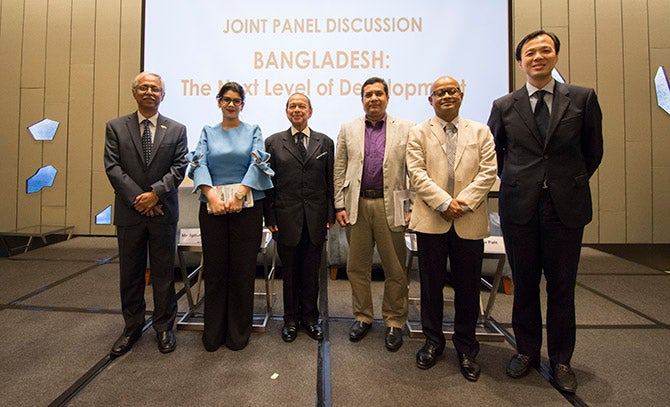
| Event Title: | ISAS Joint Symposium |
| Topic: | Bangladesh: The Next Level of Development |
| Date/Time: | 15 May 2018 | 15:00 - 04:18 |
| Venue: | Pacific 1, Level 1, Pan Pacific Hotel |
| Speaker/s: | Multiple Speakers |
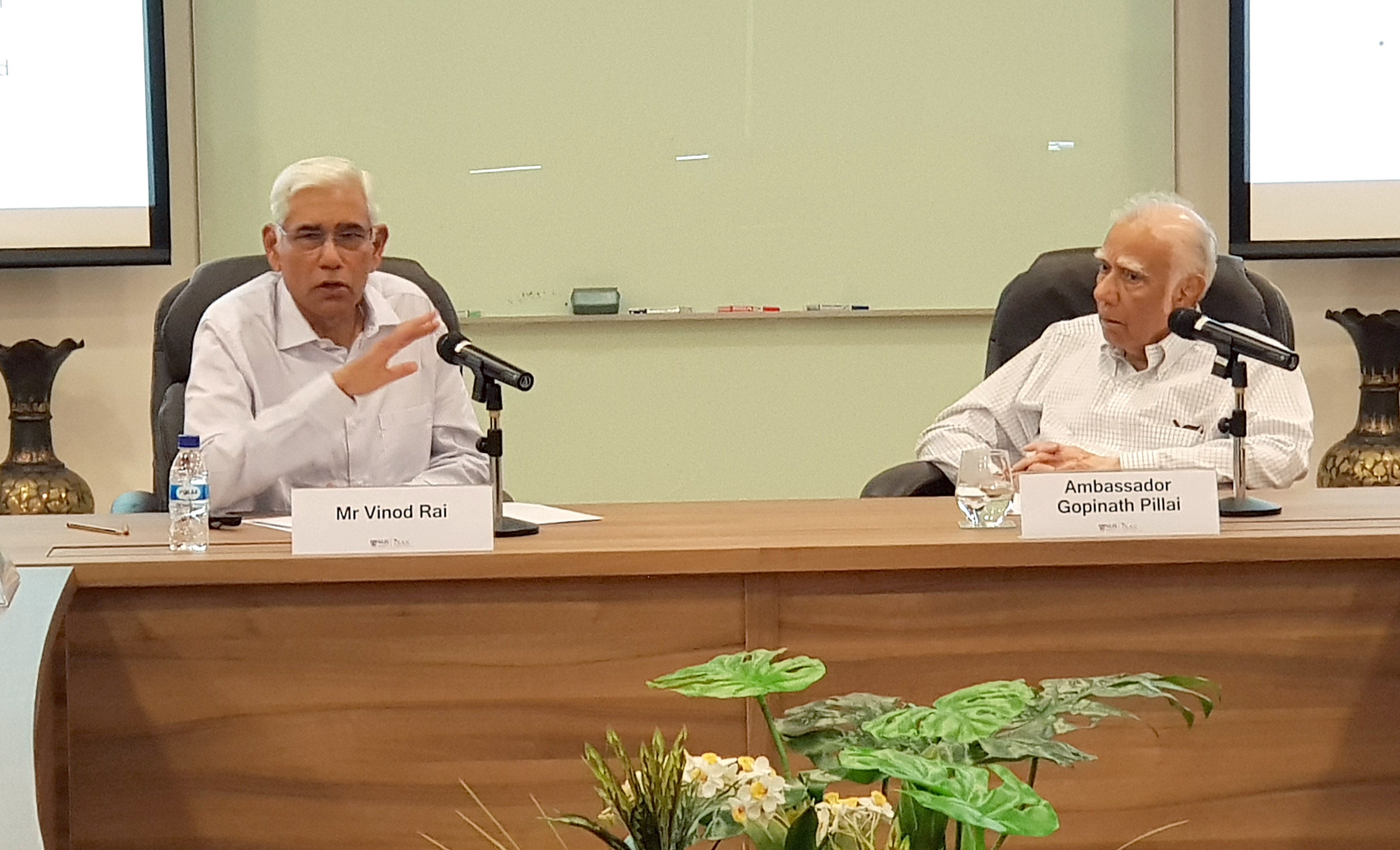
| Event Title: | ISAS Closed Door Session |
| Topic: | Proposal to Impeach a Chief Justice – Can it ever be Apolitical? |
| Date/Time: | 10 May 2018 | 14:30 - 04:18 |
| Venue: | ISAS Board Room, Level 9, 29 Heng Mui Keng Terrace |
| Speaker/s: | Mr Vinod Rai |
| Description: | Mr Vinod Rai, Distinguished Visiting Research Fellow, ISAS; and 11th Comptroller and Auditor General of India was invited for a closed door session on ‘Proposal to Impeach a Chief Justice – Can it ever be Apolitical?’. The session was chaired by Ambassador Gopinath Pillai, Chairman, ISAS, NUS, and Ambassador-at-large, Ministry of Foreign Affairs, Singapore.
Mr Rai began his presentation by discussing the key features of the notice issued by the Congress and other opposition parties on 14 April 2018 for the impeachment of the Chief Justice of India, Dipak Misra. The notice was submitted to Vice President and Rajya Sabha Chairman M Venkaiah Naidu under five grounds of misbehaviour. This is the first time in the history of India that a motion for the impeachment of a Chief Justice of India has been presented. Mr Rai shared that the impeachment notice came a day after the Supreme Court rejected petitions seeking an independent probe into the death of Judge B H Loya, who was hearing the Sohrabuddin Sheikh encounter case. Mr Naidu rejected the impeachment notice on the claim that the opposition MPs’ notice was based on suspicion and lacked substantial evidence. Congress leader Kapil Sibal reacted saying that the Rajya Sabha Chairman's order was "ill-advised and illegal" and pointed to the need to set up an inquiry committee to look into the case. He later withdrew a petition challenging Mr Naidu’s decision to reject the impeachment notice. Touching upon the constitutional provisions laid out for impeachment of judges in the Supreme Court and High Courts, Mr Rai noted that a judge can be removed for proven ‘misbehaviour or incapacity’ only on an order from the President based on a motion passed by both Houses of Parliament. Mr Rai elaborated upon the consequences of a notice to impeach the chief justice. It weakens the judiciary, reduces its independence, emboldens the government to bring charges against any judge that it does not like, and poorly reflects all pillars of democracy in the country. Mr Rai shared that the Judges (Inquiry) Bill 2006, which was introduced to deal with complaints against judges, had not been passed. He emphasized the need to introduce a similar mechanism which will be internal to the judiciary. Mr Rai addressed a series of questions from the audience. Dr Narayan noted that several countries do not have a formal procedure for impeachment of a chief justice. In this context, he enquired why it is that a liberal democracy like India is pursuing a line not taken up by other countries. Mr Rai reiterated that every few years impeachment notices seem to be issued in India. This seems to be influenced by a political agenda. If politicians or politics is involved in the appointment of a chief justice, then it is bound to be involved in his/her impeachment as well. Invariably, the impeachment of a chief justice becomes a political matter. |
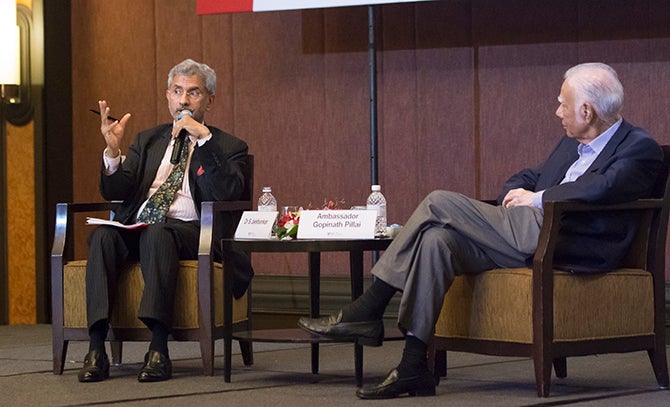
| Event Title: | ISAS Public Lecture |
| Topic: | India-China Relations in an Uncertain World |
| Date/Time: | 09 May 2018 | 16:00 - 04:18 |
| Venue: | Ballroom 3, Level 3, Orchard Hotel Singapore |
| Speaker/s: | Dr S Jaishankar |
| Description: | Dr S Jaishankar, Distinguished Visiting Fellow at ISAS-NUS and Former Foreign Secretary of India was invited to deliver the fifth ISAS Lecture on ‘India-China relations in an Uncertain World’. Chairman ISAS, Ambassador Gopinath Pillai gave the opening remarks and while introducing the topic, highlighted the timeliness of the lecture in light of the Wuhan meeting between Prime Minister Narendra Modi and President Xi Jinping on 22-23 April. Even though this was overshadowed by the meeting between North Korea's leader Kim Jong Un and South Korea's President Moon Jae-in on the same dates, Ambassador Pillai explained that the meeting was important because relations have been tense in the recent past and India and China are the two largest countries in the world.
In his lecture, Dr Jaishankar noted that India and China’s relationship was a critical one for Asia and the world. Starting with the turbulent global political situation, Dr Jaishankar explained that protectionism and cultural nationalism were on the rise, resulting in volatile and confrontational relationships between global powers. In this backdrop, India was a strong and stable rising power, stepping up to its responsibilities. However, it faced challenges of regionalism and cooperation in its neighbourhood, in the light of China’s growing dominance in the international area. In this scenario, the security concerns of both countries had not converged and relations were difficult. Yet, he highlighted that both were civilizational states and economic interactions as well as people-to-people contacts have been robust. Thus, he was hopeful that the two countries could work together and make their ties a factor of stability in these uncertain times, and not allow their differences to become disputes. He noted that the meeting of the two leaders at Wuhan was an encouraging sign, with the goal of forging a personal connection and engaging positively with each other. The audience asked a variety of questions, and there were detailed discussions on the rise of nationalism in the world, Chinese FDIs into India and vice versa, capitalism and communism in China and India’s view of the US withdrawal from Iranian nuclear deal. |
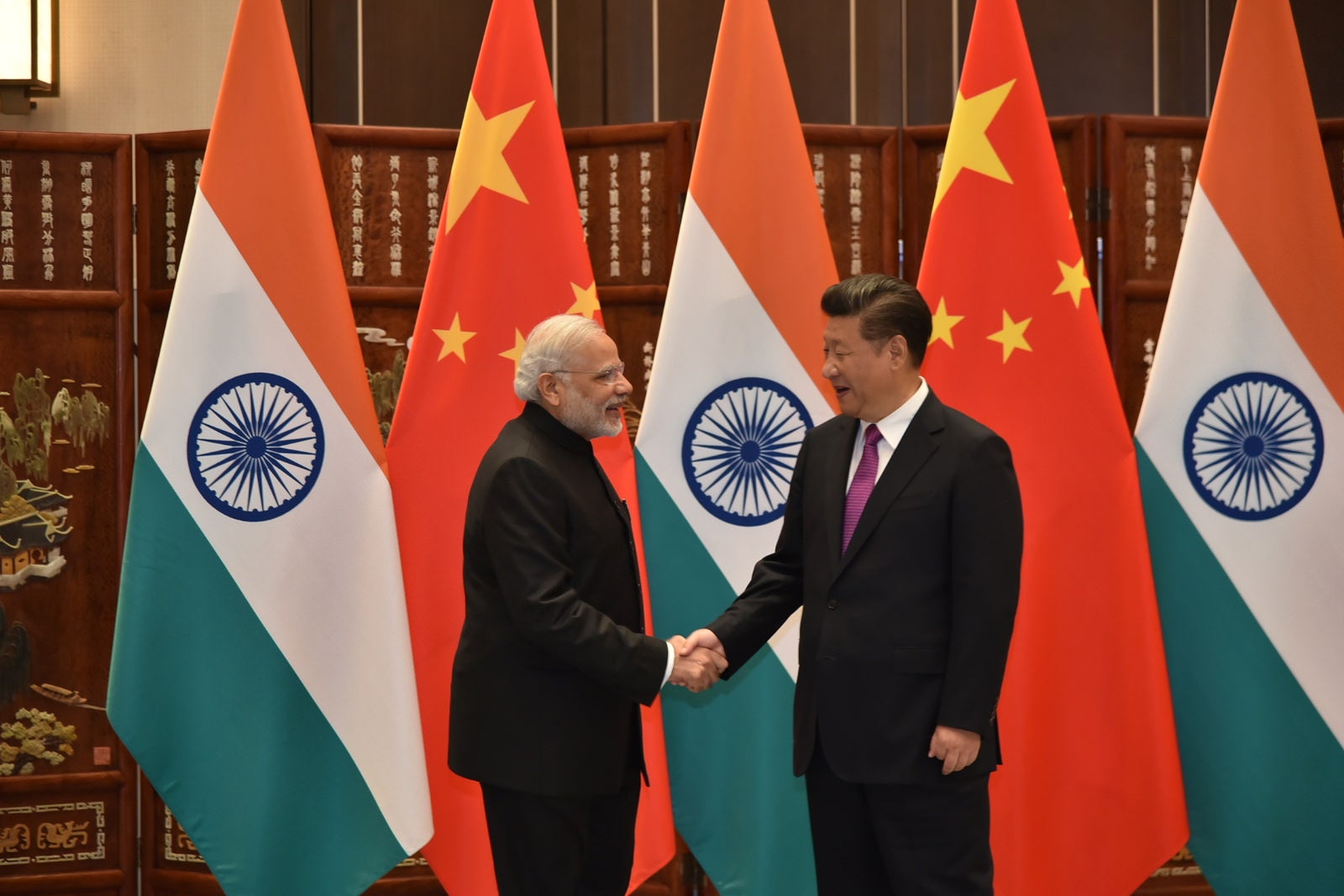
| Event Title: | ISAS Closed Door Session |
| Topic: | Update on India-China Relations |
| Date/Time: | 07 May 2018 | 17:30 - 04:18 |
| Venue: | ISAS Board Room, Level 9, 29 Heng Mui Keng Terrace |
| Speaker/s: | Dr S Jaishankar |
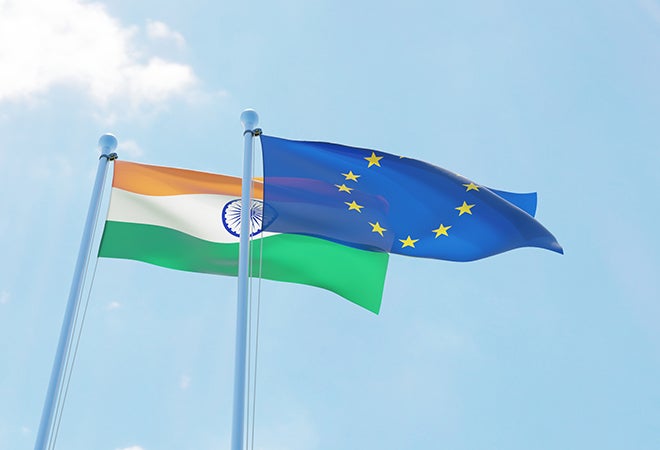
| Event Title: | ISAS Seminar |
| Topic: | Bringing Back the Old? – India-Europe Partnership in the Indo-Pacific |
| Date/Time: | 02 May 2018 | 15:00 - 04:18 |
| Speaker/s: | Prof C Raja Mohan |
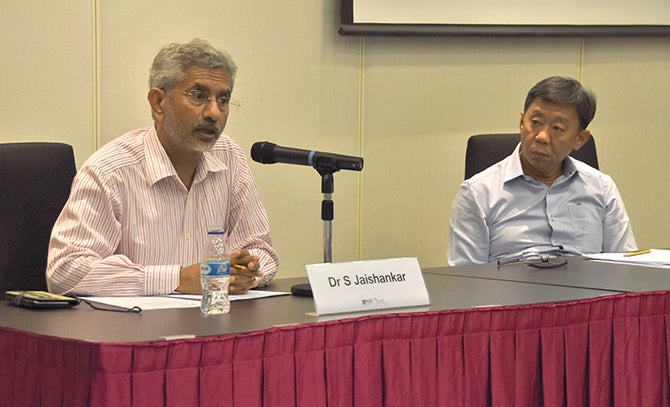
| Event Title: | ISAS Closed Door Session |
| Topic: | India and China: Compulsions of Cooperation |
| Date/Time: | 26 April 2018 | 16:00 - 04:18 |
| Venue: | MEI Conference Room, Level 6, 29 Heng Mui Keng Terrace |
| Speaker/s: | Dr S Jaishankar |
| Description: | The closed-door session with Dr S Jaishankar was held on 19 April 2018. Dr Jaishankar spoke about the upcoming Wuhan Summit scheduled to be held on (date) between Indian Prime Minister Narendra Modi and Chinese President Xi Jin Ping. He said that the two countries were planning to hold a meeting for a while. However, the meeting was postponed when the Doklam incident took place in 2017. He was optimistic that the informal summit could help to reset relations between the two countries. Dr Jaishankar shared that India and China have a complex relationship since both are ancient civilisations and rising powers. He explored the history of Indo-Sino relations. Both countries have significantly influenced the other in areas of culture, arts and religion. There have been many instances when their bilateral relations were on an upward trajectory. However, the 1962 Sino-Indian War broke down their relations. There are now apprehensions on China’s Belt and Road Initiative (BRI) from the Indian side due to sovereignty issues. India is concerned that a part of BRI may go through its territory. There are similar concerns about China-Pakistan Economic Corridor (CPEC) as well. |
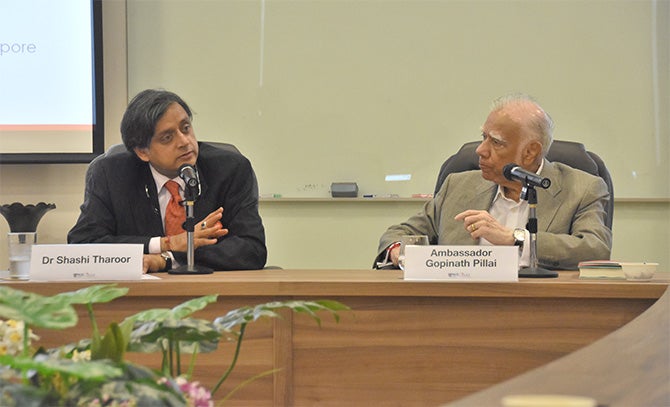
| Event Title: | ISAS Closed Door Session |
| Topic: | India in the 21st Century |
| Date/Time: | 26 April 2018 | 13:00 - 04:18 |
| Venue: | ISAS Board Room, Level 9, 29 Heng Mui Keng Terrace |
| Speaker/s: | Dr Sashi Tharoor |
| Description: | Dr Shashi Tharoor, Lok Sabha Member of Parliament for Thiruvananthapuram Constituency and Chairman, Parliamentary Standing Committee on External Affairs, India, was invited to ISAS for a closed door session on ‘India in the 21st Century’. This session was moderated by Ambassador Gopinath Pillai, Chairman, ISAS and Ambassador-at-Large, Ministry of Foreign Affairs, Singapore.
Ambassador Pillai began the session by welcoming the audience and thanking Connected to India for arranging the session. He also narrated an anecdote on learned Indians and put forth the question of why talented younger members of India’s Congress party did not get much exposure. The attendees comprised representatives from the Ministry of Foreign Affairs, ISAS research staff as well as representatives from the High Commission of India to Singapore. Dr Tharoor began by stating that he would focus on four themes for his presentation, two domestic and two international. The first domestic theme was that of development. Dr Tharoor highlighted that every single Lok Sabha MP represented a majority of voters living on less than USD 2 a day and all MPs were accountable to these electorates. Therefore development was a critical issue as everything else was secondary to the provision of food, housing, jobs and opportunities. The second domestic theme touched on by Dr Tharoor was of the state of pluralism and religious harmony in the country. Dr Tharoor narrated the example of the religiously diverse nature of the armed forces during the 1971 Bangladesh Liberation war as an example of India’s historically secular nature. He opined that although there had traditionally been a consensus on ‘how to disagree’ in this debate, the ‘ground rules’ were being challenged in recent years. The first international theme covered by Dr Tharoor was of India’s place in the world. He explained that under Prime Minister Manmohan Singh, there was a doctrine of orienting Indian foreign policy itself towards the principal and overriding responsibility of the government to its people. He stated that Prime Minister Modi had carried on with this policy. Dr Tharoor opined that India has not fully tapped its potential in international relations despite having good relations with several countries (for example, India did not play a role in the Iran agreement despite cordial relations with both America and Iran). Dr Tharoor’s second international theme was that of the neighbourhood, which he described as being of ‘colossal importance’ to India. He highlighted that the key to India’s relations in the neighbourhood was conceding ‘asymmetrical relations’ i.e. giving more than it received. The interactive session involved choice questions from the audience. The topics discussed included the Congress party’s projections for the 2019 general elections (including the role of the Congress and regional parties in the opposition), the dysfunctionality of Indian Parliament, India’s policy towards China, what could have been done differently since 1990 to alleviate poverty, and whether the Congress needed to reclaim nationalism while dealing with its own dynastic hierarchy. |

| Event Title: | ISAS Closed Door Session |
| Topic: | Presentation by Oxford University Press |
| Date/Time: | 24 April 2018 | 15:00 - 04:18 |
| Venue: | ISAS Board Room, Level 9, 29 Heng Mui Keng Terrace |
| Speaker/s: | Mr Niko Pfund |

| Event Title: | ISAS Seminar |
| Topic: | Transition in Afghanistan: Past Challenges, Future Prospects |
| Date/Time: | 11 April 2018 | 15:00 - 04:18 |
| Venue: | ISAS Board Room, Level 9, 29 Heng Mui Keng Terrace |
| Speaker/s: | Prof William Maley |
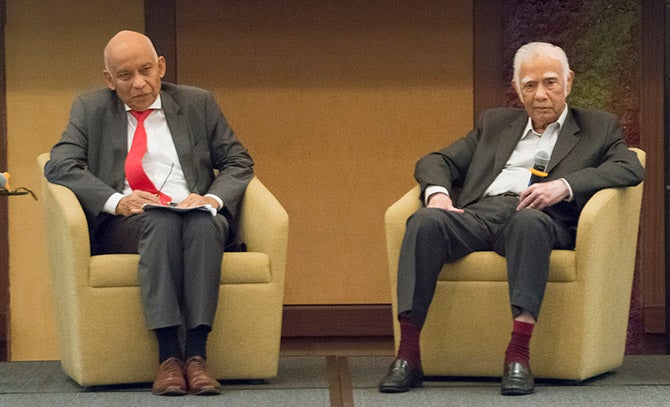
| Event Title: | Fourth ISAS Lecture |
| Topic: | India: Democracy against Development ? |
| Date/Time: | 10 April 2018 | 16:30 - 18:30 |
| Venue: | Capricorn Ballroom, Level 1, Marina Mandarin Hotel |
| Speaker/s: | Professor Subrata Kumar Mitra |
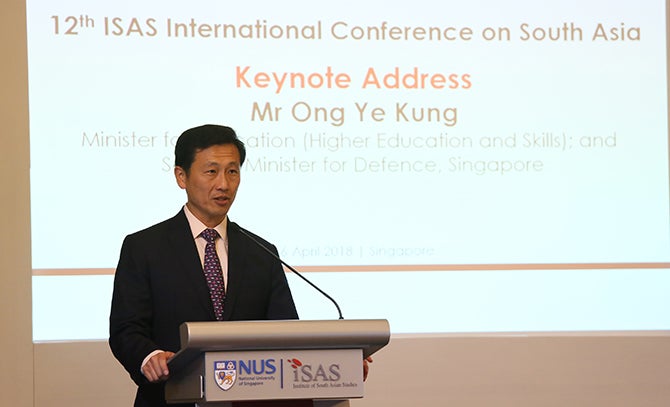
| Event Title: | ISAS 12th International Conference on South Asia |
| Topic: | Emerging South Asia : Politics, Economy and International Relations |
| Date/Time: | 06 April 2018 | 09:15 - 18:30 |
| Venue: | Orchard Hotel, Grand Ballroom, Level 3 |
| Speaker/s: | Multiple Speakers |
| Youtube: | https://youtu.be/e4KMqXsbXB0 |

| Event Title: | ISAS Book Launch |
| Topic: | Seven Decades of Independent India: Ideas and Reflections (edited by Vinod Rai and Amitendu Palit) |
| Date/Time: | 28 March 2018 | 18:30 - 21:00 |
| Venue: | Taj Mahal Palace, Mumbai, India |
| Speaker/s: | Mr Ajit Singh, Dr Amitendu Palit, Dr Ashok Gulati, Dr S Y Quraishi |
| Chairperson: | Mr Vinod Rai |
| Youtube: | https://www.youtube.com/watch?v=5f-aPzSrb3s |
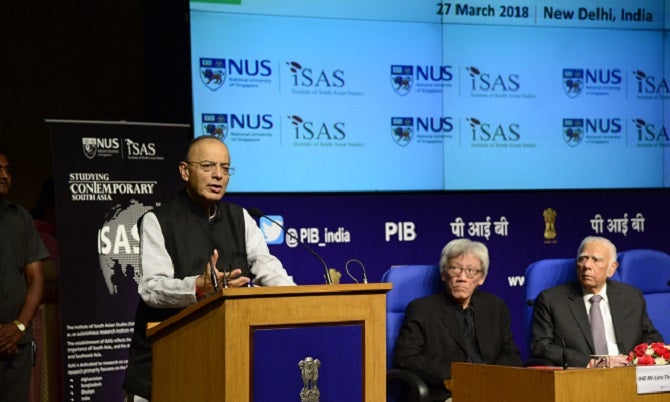
| Event Title: | ISAS Book Launch |
| Topic: | Seven Decades of Independent India: Ideas and Reflections (edited by Vinod Rai and Amitendu Palit) |
| Date/Time: | 27 March 2018 | 18:30 - 21:00 |
| Venue: | National Media Centre, New Delhi, India |
| Speaker/s: | Mr Arun Jaitley, Minister of Finance and Corporate Affairs, India (Guest-of-Honour), Dr Rajiv Kumar, Vice-Chairman, NITI Aayog, India, Mr Shivshankar Menon, Distinguished Visiting Research Fellow, ISAS-NUS; and Institute of South Asian Studies, NUS; and Former National Security Advisor to the Prime Minister of India, Ms Poonam Mutthreja, Executive Director, Population Foundation of India, Mr Vinod Rai, Distinguished Visiting Research Fellow, ISAS-NUS; and 11th Comptroller and Auditor General of India |
| Chairperson: | Dr Amitendu Palit, Senior Research Fellow and Research Lead (Trade and Economics), Institute of South Asian Studies, NUS |
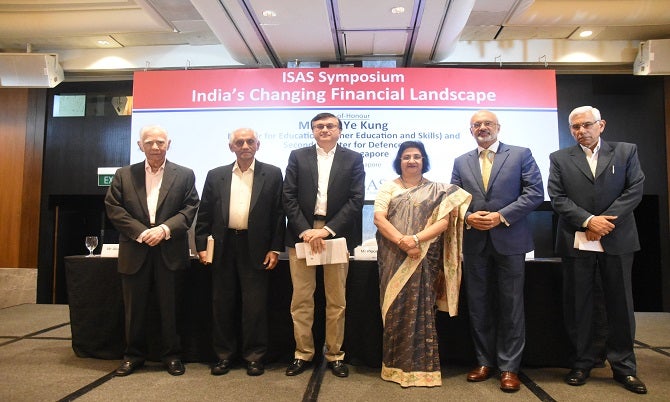
| Event Title: | ISAS Symposium |
| Topic: | India’s Changing Financial Landscape |
| Date/Time: | 23 March 2018 | 14:30 - 17:30 |
| Venue: | Hilton Hotel, Ballroom 1, Level 3 |
| Speaker/s: | Mr Ong Ye Kung, Ms Arundhati Bhattacharya, Mr Akash Prakash, Mr Piyush Gupta, Mr Vinod Rai |
| Chairperson: | Mr J Y Pillay |
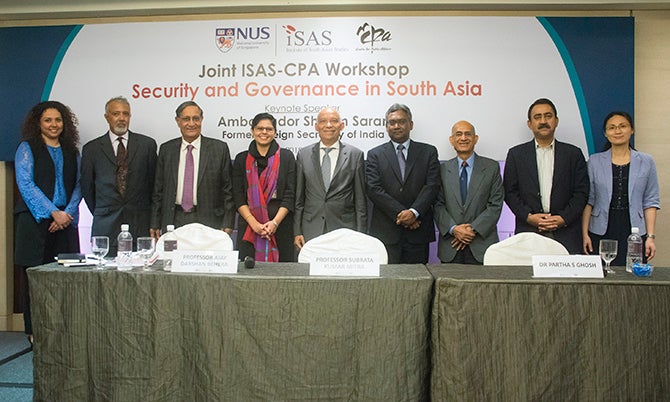
| Event Title: | Joint ISAS-CPA Workshop |
| Topic: | Security and Governance in South Asia |
| Date/Time: | 09 March 2018 | 09:30 - 17:30 |
| Venue: | Empress I and II Ballroom, Level 3, Carlton Hotel |
| Speaker/s: | Multiple Speakers |
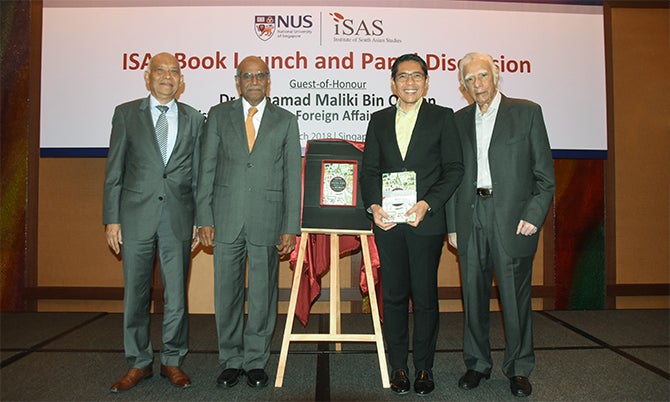
| Event Title: | ISAS Book Launch and Panel Discussion |
| Topic: | India’s Foreign Policy Imperatives in a Changing World |
| Date/Time: | 06 March 2018 | 10:00 - 13:30 |
| Venue: | Capricorn Ballroom, Level 1, Marina Mandarin Hotel |
| Speaker/s: | Ambassador Shyam Saran, Dr Iftekhar Chowdhury, Dr Rohan Mukherjee |
| Chairperson: | Dr Rani Mullen |
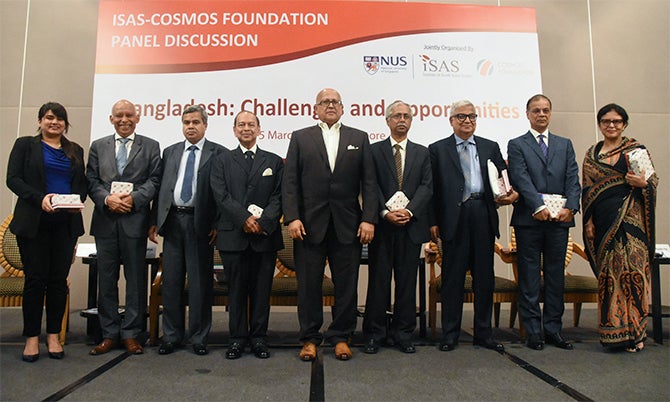
| Event Title: | ISAS-COSMOS Foundation Panel Discussion |
| Topic: | Bangladesh: Challenges and Opportunities |
| Date/Time: | 05 March 2018 | 15:00 - 20:30 |
| Venue: | Orchard Hotel, Ballroom 3, Level 3 |
| Speaker/s: | Multiple Speakers |
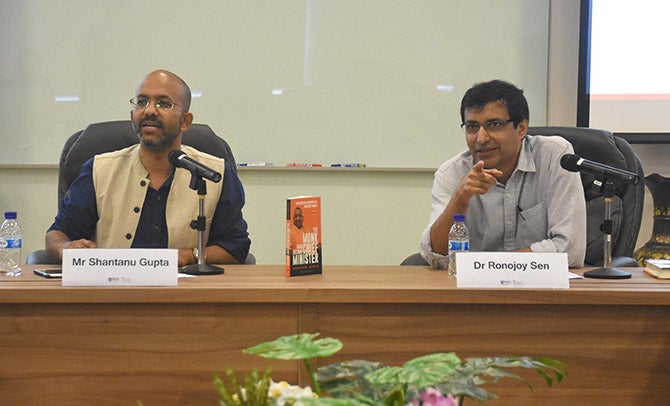
| Event Title: | ISAS Seminar |
| Topic: | The Monk Who Became Chief Minister |
| Date/Time: | 01 March 2018 | 15:00 - 16:45 |
| Venue: | ISAS Board Room |
| Speaker/s: | Mr Shantanu Gupta |
| Chairperson: | Dr Ronojoy Sen |
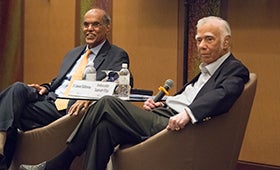
| Event Title: | Third ISAS Lecture |
| Topic: | India in a Globalising World |
| Date/Time: | 28 February 2018 | 15:30 - 17:00 |
| Venue: | Taurus Ballroom, Level 1, Marina Mandarin Hotel |
| Speaker/s: | Dr Duvvuri Subbarao |
| Chairperson: | Ambassador Gopinath Pillai |
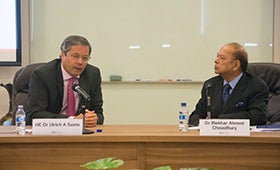
| Event Title: | ISAS Ambassadors’ Lecture |
| Topic: | Germany and Europe – Strategic Partners for Singapore and ASEAN |
| Date/Time: | 26 February 2018 | 10:30 - 12:00 |
| Venue: | ISAS Board Room |
| Chairperson: | Dr Iftekhar Chowdhury |
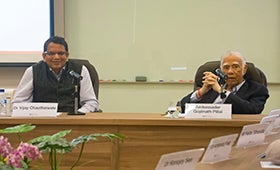
| Event Title: | ISAS Closed Door Session |
| Topic: | Challenges and Opportunities for the Bharatiya Janata Party in 2019 |
| Date/Time: | 20 February 2018 | 16:00 - 17:30 |
| Venue: | ISAS Board Room |
| Speaker/s: | Dr Vijay Chauthaiwale |
| Chairperson: | Ambassador Gopinath Pillai |
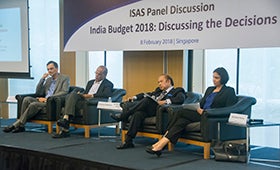
| Event Title: | ISAS Panel Discussion |
| Topic: | India Budget 2018: Discussing the Decisions |
| Date/Time: | 08 February 2018 | 15:00 - 18:00 |
| Venue: | Room 300-301, Level 3 | Suntec Singapore Convention & Exhibition Centre |
| Speaker/s: | Dr Duvvuri Subbarao, Ms Sonal Varma |
| Chairperson: | Dr Venkatraman Anantha-Nageswaran |
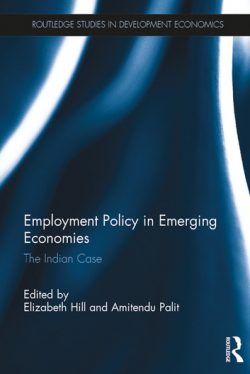
| Event Title: | ISAS Book Launch & Panel Discussion |
| Topic: | Employment Policy in Emerging Economies : The Indian Case |
| Date/Time: | 02 February 2018 | 15:00 - 17:00 |
| Venue: | NUSS Guild House |
| Speaker/s: | Dr Amitendu Palit, Prof Elizabeth Hill |
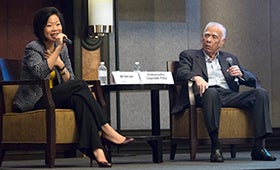
| Event Title: | Joint ISAS-Pathfinder Foundation Symposium |
| Topic: | The Belt and Road Initiative – Politics, Potentials and Partnerships |
| Date/Time: | 29 January 2018 | 09:00 - 18:00 |
| Venue: | Orchard Hotel, Ballroom 3, Level 3 |
| Speaker/s: | Multiple Speakers |
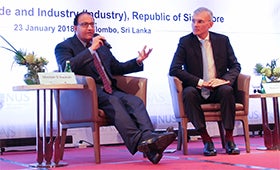
| Event Title: | ISAS Colombo Colloquium 2018 |
| Topic: | Singapore and Sri Lanka in a Fast Growing Region |
| Date/Time: | 23 January 2018 | 15:00 - 17:00 |
| Venue: | Shangri-La Hotel, Colombo, Sri Lanka |
| Speaker/s: | Minister S Iswaran, Professor Razeen Sally |
| Youtube: | https://youtu.be/0buXs9PtHyk |
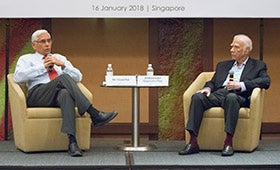
| Event Title: | Second ISAS Lecture |
| Topic: | The Indian Civil Service : Has it Delivered ? |
| Date/Time: | 16 January 2018 | 16:30 - 18:15 |
| Venue: | Capricorn Ballroom, Level 1, Marina Mandarin Ballroom |
| Speaker/s: | Mr Vinod Rai |
| Chairperson: | Ambassador Gopinath Pillai |
| Youtube: | https://youtu.be/8Zq07gPZTec |
Load more


